






e gift drive is a great way to give back to those in need. … Giving back to the community is always amazing.
Tom Shimoni senior class president


Every December, the South community comes together to participate in a holiday-themed charity e ort to bring gifts to children in need. is year, 25 groups including advisories, classes and departments are helping families at the BromleyHeath Housing Project in Jamaica Plain. Participating groups “adopt” a child, meaning that students and educators gather gifts, ranging from clothes to toys to books.
ey wish to give the City of Newton and Newton Conservators the opportunity to purchase the property … for purposes like the expansion of open space, the school district, recreation or other municipal uses
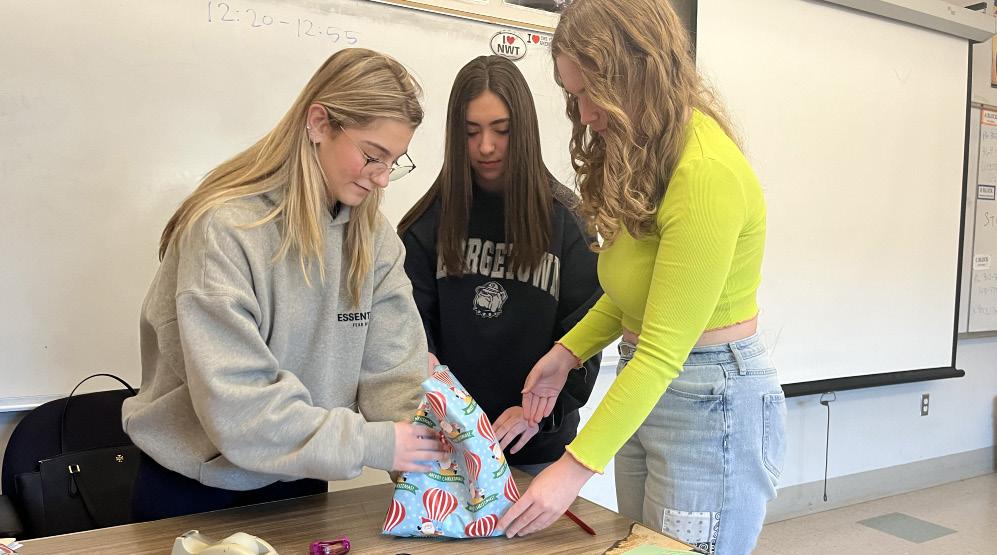

David A. Rosen chairman of LandVest Real Estate via The Boston Globe
e city’s interests include the provision of affordable housing in excess of the city’s requirements and reserves [space] for future school or recreation facility needs.
Ruthanne Fuller mayor of Newton via a community update
of a 15-acre property across from South recently put up the land for sale, o ering the city of Newton an opportunity to buy the estate for $24 million. e majority of the land, between Brandeis and Dudley Roads, is currently zoned to be a single-family residence, however Mayor Ruthanne Fuller hopes to develop the land into a ordable housing units. e city has issued an Expression of Interest request to potential partners to jointly develop the property.
e gift drive allows us to take stock of all we have, as individuals and collectively as a community … [It’s] a small way for me to remind myself that I am really fortunate as I intentionally spend money for someone else's joy.
Michelle Caine biology teacherWe need to celebrate these victories, but we also have to understand we have a long way to go. ere’s lots of work to do until this becomes the norm.
Lisa Linde music teacherere are lots of young people who are hesitant to get into politics, whether it's because of gender, race or sexual orientation … Now they have someone who says [that] you can.
 photo by Jaesuh Lee
Attorney General Maura Healey’s decisive victory in the November 8 state election marked a momentous occasion in state politics: she became the rst woman in Massachusetts history and the rst openly lesbian candidate in the country to ever be elected governor, the highest position of power in the state. Members of the South community praised the milestone as a step in the right direction toward diversity in gender and sexual-orientation.
photo courtesy of WBUR
Matthew Wilson English teacher
Owners
photo courtesy of Boston Globe
graphics by Emily Cheng
photo by Jaesuh Lee
Attorney General Maura Healey’s decisive victory in the November 8 state election marked a momentous occasion in state politics: she became the rst woman in Massachusetts history and the rst openly lesbian candidate in the country to ever be elected governor, the highest position of power in the state. Members of the South community praised the milestone as a step in the right direction toward diversity in gender and sexual-orientation.
photo courtesy of WBUR
Matthew Wilson English teacher
Owners
photo courtesy of Boston Globe
graphics by Emily Cheng
In light of grading discrepancies in many departments’ testing practices, students and faculty have been working to create universal test retake policies across the school.
South has never had an o cial policy that mandates test retakes. Currently, only the history department follows a uniform policy, which allows students to retake a test if they initially scored below 80%.
Department head Jennifer Morrill said that changes during the pandemic forced her to reevaluate the way the department assesses grades.
“During COVID, everything was kind of thrown up in the air,” she said. “You have to think about how fair it is to grade students in this atmosphere, and that made us have conversations, and then pushed us to reconsider some of our approaches.”
Although the math department has not enforced a retake policy, department head Alex Kraus said that he has experimented with different grading policies in his own classroom.
ate multiple opportunities for competency,” he said. "We are continually working for a way to clearly represent student learning that really is equitable and does not disadvantage
any particular group or place one group over another in terms of giving undue advantages.”
Sophomore Adam Sheena said that the lack of standardized grading policies within departments can lead to unfair advantages.
“Grading and homework policies should be consistent throughout departments. Students shouldn't be getting an A in a class just because by chance they got a more forgiving teacher,” he said.
Junior Juliana Gomez Reynoso said that classes’ di culty should not be dependent upon the teacher.
“Sometimes it can feel unfair because my friend has easier work or a grading system that puts less pressure on their test grades. Because of this, I constantly compare my grade to what it could be if my teacher had the same grading system as another teacher who teaches the subject and is more lenient,” she said.
To combat the lack of uniformity across the school, both the South Senate and the recently-created Grading for Equity group have been pushing for standardization and clarity of teachers’ policies.
English department head Brian Baron
that at meetings every Wednesday morning, he goes over the group’s objectives.
“One of our long-term goals is to get the school to agree on what grades communicate, and we want grades to communicate student learning as much as possible. Our goals for this year are to get better individually and to bring more people into the conversation,” he said.
Creating a universal understanding of the purpose and value of a letter grade has proven to be a di cult task, as the discussion has been ongoing for the last three school years. Baron said that although the group does not have the authority to implement a policy, its members share a common goal.
“We're just a group of teachers and administrators who think that we need to have a uniform grading policy at school, and creating one on the basis of promoting fairness and equity seems like a logical way to go about doing that,” he said.

South Senate’s Academics Committee is working to make similar changes in the clarity and uniformity of grading. On Dec. 7, senators approved a policy requiring teachers to post their retake policies on the syllabus at
administration has not yet approved the bill.
Sophomore senator Sarina Chand said that clarifying the current rules is the best place to start in establishing a schoolwide retake policy.
“What we're trying to do is make sure that students are aware of what their retake policies are … and that teachers aren’t able to change their policies without students knowing,” she said.
Senior senator Lily Paltrowitz said that she hopes the new policy will address previous communication issues between students and teachers.
“It will be more transparent between teachers and students on what the retake policy is,” she said. “ ere will also be more trust between teachers and students when there’s a single policy that both people have to adhere to.”
Kraus said that a core value of a universal testing policy should be ensuring an accurate re ection of student learning.
“We should have a system of evaluating students that understands that learning is a process, it doesn't always come at the same rate to all students and that learning is a process that is supposed to contain mistakes,” he
In October, Parents Defending Education (PDE), a national right-wing nonpro t, led a civil rights complaint with the Department of Education against Newton North High School. e Oct. 4 complaint, available on their website, targeted the annual production “Lost and Found: Stories of People of Color by People of Color'' performed by North students.
PDE claimed that the production violated Title VI of the Civil Rights Act of 1964 and the Equal Protection Clause of the 14th Amendment, which outlaws discrimination on the basis of race, color or national origin in programs or activities receiving federal funding.
Despite the complaint, North students are currently rehearsing for this year’s production, which will run from Jan. 19-22.
Last year, PDE sued Wellesley High School for hosting a discussion forum for Asian students regarding a hate-motivated shooting at a massage parlor in Atlanta. e organization claims that there have been 43 incidents when Massachusetts schools taught about race, gender or sexual orientation in an illegal manner.
PDE did not respond to interview requests. eir website states that they are dedicated to ghting indoctrination in the classroom by removing politics from public education. Claiming to be grassroots and locally engaged, leaders of PDE have made frequent appearances on the national right-wing networks Fox News and Newsmax and have pushed back against pro-LGBTQ policies.
According to their website, PDE
“believe[s] our children’s education should be based on scholarship and facts, and should nurture their development into the happy, resilient, free-thinking, educated citizens every democracy needs. Our classrooms should include rigorous instruction in history, civics, literature, math, the sciences and the ideas and values that enrich our country.”
e organization’s complaint claimed that the theater department’s application for auditions, which requests a headshot and for students to identify themselves racially and ethnically, is discriminatory.
e performance description does not assert that participation in this performance is open to all,” their website said. “Accordingly, we ask that the Department [of Education] promptly investigate the allegations in this complaint, act swiftly to remedy unlawful policies and practices and order appropriate relief.”
South theater department head Je Knoedler said that “Lost and Found” was organized to allow students to discuss and share their experiences with others.
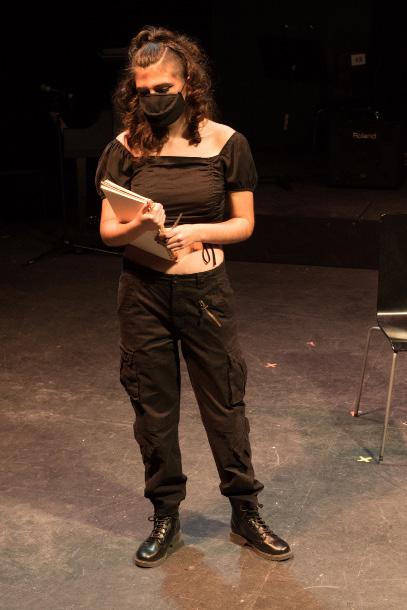
“ e intention of the production was to give a safe space to students of color where they can talk about racism and other things that are a ecting them,” he said.
North junior class vice president Zonna Okonkwo said that “Lost and Found” o ers opportunities for numerous forms of creative expression.
“ e show is a cabaret for students of color,” she said. “ ey can sing, dance or even give a poem or a monologue.”
For North senior Asa Karon, who codesigned last year’s production, the show gives students a chance to explore and express their
identity in new creative ways.
“It's interesting because lots of times it isn't just theater. It's some theater, some music, some art pieces that people made that they put up outside,” she said.“ ere's musical numbers that people wrote or performed. Some of them were reading poems.”
While a goal of the production is to project the voices of people of color within the North community, North Principal Henry Turner said that no students were prohibited from auditioning.
“A performance that shares the stories of students of color is certainly important and in line with the values of our school, but no one was prevented from trying out. It wasn’t limited to certain groups,” he said.
Okonkwo said that the production’s intention is not to discriminate, but rather to provide historically marginalized people the opportunity to share their voices.
" e point of the show is to create a safe space for POC students,” she said. “ ere are so many other opportunities that [White students] can participate in because they're White and won't be excluded for their race.”
South sophomore Sonia MilstenOckene said that although theater should be a place for everyone, prioritizing minority groups ensures that everyone has the opportunity to get involved.
“Everyone should be allowed to do theater but, sometimes minority groups should be given the chance to have more of an experience in theater than they might have otherwise,” she said.
South sophomore Asher Navinsky, who is a member of South Stage, said that the
bene ts of theater extend beyond performers to the audience as well.
“ e great thing about theater is it can educate you through story so everyone can get involved with it,” he said. “You can purely follow the story or you can use it as a way to teach something.”
Turner said the annual production has become an ongoing source of joy and education at North.
“ e students who created the idea and the students who have participated before have certainly had a way of lifting our spirits,” he said. is is a great new tradition for our school.”

On March 14, Newton residents will vote on a proposed property tax increase following the City Council’s Nov. 21 decision to hold a special election on the measure. e tax override, which consists of three questions, would fund improvements around the city, including elementary school building construction.
All questions ask voters to approve an exemption to Proposition 2 1/2, a state regulation that limits yearly property tax increases to 2 1/2%.

Question One is an operating city budget override that would raise an additional $9.175 million in taxes each year to fund Newton Public Schools (NPS), street and sidewalk construction, programs for senior citizens and city-wide environmental improvements. Tax increases for Question 1 would begin in July 2023.
Questions Two and ree are debt exclusion overrides that would allow the city to pay for the debt service from bonds to renovate or replace the Countryside and Franklin elementary schools.
$2.3 million would be raised for Countryside and $3.5 million would be raised for Franklin. ese increases would not go into e ect until the bonding process begins and are not permanent.
e override would raise the taxes for Newton’s median home valued at $1.2 million by $290 for the next scal year and an additional $183 by 2030, when the bonding is in place for the elementary schools. In an Oct. 19 interview with NewTV, Mayor Ruthanne Fuller said she created the override proposal as a response to what residents want.
“We are continuously updating our nancial plans and you can imagine during the worst of the pandemic how di cult that was. We're always looking at what the needs are of our residents and students,” she said. “We're always taking that information and saying, ‘So what do we need to do to meet the high expectations of Newtonians?’ at's how it all
came together.”
City Council Vice President Rick Lipof said that for the city to continue funding projects at its current rate, the override is necessary.
“Whenever the city asks for one, it's serious. We don't do it to have extra money. We do it for speci c projects or to keep pace,” he said. “What an override is about is paying for things that if we don't get the money, we may not be able to do.”
However, in the City Council’s Nov. 21 meeting, Councilor Leonard Gentile said that the override is unneeded and that the city should work with what it has, including its $42 million of unused COVID-19 relief funds.
“I don't know how you go out to the taxpayers having received that amount of money, and still having a substantial amount of money, and tell them that we need more,” he said. “We don't have a revenue problem. If anything, we have, at times, a spending problem.”
City Councilor Tarik Lucas, who is undecided on the operating override but supports the debt exclusion overrides, said that he has heard from residents who are against a permanent tax increase, particularly with rising in ation.
“ e cost of everything due to in ation, cost of living, cost of housing, interest rates, they're all going up,” he said. “As they say, in ation is a hidden tax. Well, here is an actual tax on top of that.”
Residents who support the override are organizing through Vote Yes for Newton, a ballot question committee formed by Kerry Prasad and Christine Dutt.
“ e mission that we have set for ourselves is to run a positive campaign in order to educate the voters of Newton about why we think an override is necessary and why we believe they should vote [for it],” Prasad said. “It's important for us to be running that positive campaign because we think that this is a chance for people in our community who have di erent points of view to come together.”
Since the NPS budget has been in a structural de cit for years, Dutt said that the override is crucial.
e operating override would put $4.5 million into the NPS budget,” she said. “ ere would [also] be money that would go to repairing our roads, and $500,000 to replenishing our street tree canopy, which would result in an additional 300 street trees being planted.”
e override is necessary to cover for past de cits, history teacher Michael Kozuch said, especially considering NPS’ $2.3 million budget gap last year.
“It's important to go through these overrides [with] all of the needs in education right now, in dealing with climate change and other infrastructure issues,” he said. “We had cuts last year and those cuts need to be restored. It's really important that we as a community face the challenges that are in front of us.”
said that additional funds are necessary for Franklin to house up-to-date educational programming, which is currently limited due to the building’s size. inking about the spacing for having classrooms that are large enough, having enough di erent types of rooms to have small group instruction, or to have professional meetings, or to have counseling or di erent kinds of support that students need, the building as it is just doesn't have enough spaces for all of those things to take place,” he said.
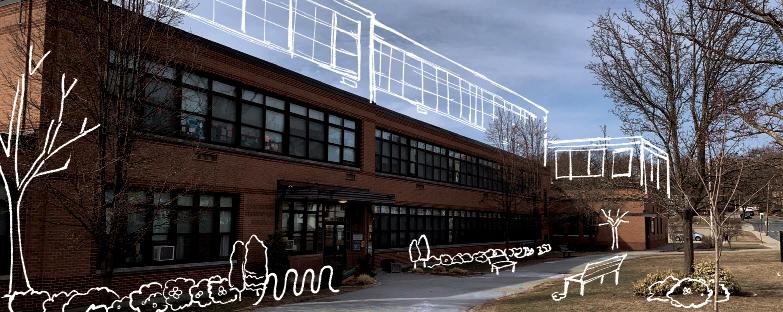
However, Chitty said that the quality of the school buildings does not deter families from looking to Newton for their children’s education.
“In Newton, families send their kids to a school system with a lot of aging facilities out of a belief that there's something special in the community and the education that they're going to get,” he said. “It happens with outdated facilities in many cases, but how much better [is it] if you can have those good things happen in newer and updated facilities?”
Residents who struggle to pay increased taxes will be supported by the city’s tax relief programs, Prasad said.
“ ere are people in Newton for which that cost is a step too far,” she said. “ e City Hall has put in place a number of programs that will help folks who qualify to either defer the taxes or to have other ways to approach paying.”
Although there is a cost to passing the override, Dutt said that it ultimately will be bene cial for the city.
e needs that Newton faces today are critical and urgent. Newton needs the revenue today,” she said.“ is override will do a good job of addressing the things that we need to take care of in our home city of Newton.”
graphic by Julie Wang Franklin Elementary School Principal and South parent Mark Chitty photo courtesy of Countryside Elementary School PTO, photoillustration by Julie Wange onset of u season this year introduced the threat of a new “tripledemic” — a dangerous combination of the u, COVID–19, and respiratory syncytial virus (RSV). Data from the Centers for Disease Control (CDC), Johns Hopkins Hospital, and the Massachusetts Department of Health show recent increases in cases, including a rise in weekly Covid infections.
Biology teacher Michelle Caine said that like in previous years, the increase in infections can be attributed to the typical di erence in weather that comes with the winter season.
“As the weather gets cooler and people's bodies are under a little more stress in terms of adjusting to di erent weather and dealing with the cold, that always leads to a little bit of a peak in illness,” she said.
Unlike past u seasons, however, school nurse Karleen Kiritsy said that the spike in illness has been heightened due to a lack of immunity from wearing masks throughout last winter.
“[During the pandemic], we were not exposed to common respiratory viruses, and so [people] haven't built up their own immunity,” she said.
ese diseases, particularly RSV, are
very dangerous for young children. In the preschool, sta members are taking extensive precautions to keep children safe. Pre-school program director Kevin Leanne said that the preschool has implemented stricter participation requirements that resemble those of the onset of Covid.
Leanne and other sta have also been more cautious when high school students taking Early Childhood Development enter the preschool.
“If [the high schoolers are] not feeling well [they just won’t] come into the preschool. Some of them will choose to wear masks and come in,” he said.
Junior Gabriella Priddis said that after having lived through several years of the pandemic, she is trying to be more vigilant in taking steps to avoid getting sick.
“Getting [Covid] is de nitely not what I want, because I don't want to go back into having to stay away from people. It's scary,” she said.
Kiritsy said that while she is aware of rising sickness rates in the nation as a whole, any risk associated with these viruses mostly a ects younger pediatric patients and does not pose a large threat to South's older high school population.
Senior Ethan Pang said that he does not plan to wear a mask when not sick and does not think that any additional mandates are necessary.
“Whenever I wear a mask it’s because I have symptoms, even if I don’t have anything serious. [It’s mostly] so that others don’t get alarmed,” he said.
South parent Hanni Menn said that no matter how much authority health o cials have, individuals are the most responsible for their own safety.
“As a parent and as a physician, I think that public health mitigation e orts are good,

but ultimately it comes down to an individual action of preventing infection,'' she said. "It's everyone's personal responsibility to be aware of the current outbreak, with Covid, RSV, and the u. [People should] frequently get tested and stay at home if they're feeling sick."
School nurse Gail Kramer said that although the illnesses have been manageable at the school so far, she still advises preventative measures.
“Stay home when you're sick. If you're coughing and you're sick, stay home, and do frequent hand washing. RSV has always been here,” she said. “Getting vaccinated against the u yearly is important, and the same for Covid, as it's been shown that vaccines for Covid really help people not get sick.”
Caine said that students should prioritize their well-being, as proper nutrition and other healthy practices are key steps in maintaining general health.
“It's good to make sure you have [all of your] vitamins and minerals and make sure you're staying away from people that are sick,” she said. “If you're sick, [what is important is] really getting rest and not trying to push through it because what your body needs more than anything else is just to be able to recover.”
Public health mitigation e orts are good, but ultimately it comes down to an individual action of preventing infection.
Hanni Menn South parent
We’ve hardly been through three semesters of the new schedule, and its negative impacts on the schoolwide community have become impossible to ignore. anks to the pandemic, we’ve had four di erent school schedule formats in the span of three years. e schedule we’ve landed on had been in the works for years until the pandemic nally provided an opportunity to start anew.
Even amidst the backdrop of pandemicinduced social isolation and declines in mental well-being, Newton Public Schools failed to reevaluate and improve the school’s support for student connection and mental health.
With a single advisory each week, three class meeting times per week, a 9 a.m. start time and new Lion and WIN Blocks, the schedule’s format strips students of the opportunities to connect that our seniors remember as freshmen.
Rather than solicit the feedback of students, teachers and families, over a year and a half later, NPS has failed to solve problems with the schedule. Just listening to students and teachers would make worlds of di erence for both students' mental health and the South community as a whole.
Let’s start with Monday morning advisory. While the vast majority of underclassmen and juniors who attended our editorial meeting indicated that they do not feel connected to their advisories, the seniors in the room still
remembered the three ve-minute blocks and one 25-minute block we attended as freshmen.
As freshmen, current seniors saw brandnew classmates often and for shorter blocks of time. Even if they spent that time sitting on our phones or catching up on schoolwork, the few minutes of near-daily facetime stoked connection. We’d nod at each other in the hall, and advisory became that familiar place for us to catch our breath in the rush of the school day.
Now, for just a 20-minute block once a week, students spend their advisory time signing up for WINs, lling out “school connectedness surveys” (see the irony?), listening to powerpoints presented by deans, practicing safety drills and even attending guidance seminars intermittently throughout the year.
Supposedly, advisory is a student’s most immediate source of community, topping the list of student supports cited in e Program of Studies. Advisories, the school claims, provide students a place to“get to know one another and a teacher,” “provide support for one another” and “have fun together by playing games and relaxing.” Clearly, that description is now passé, with advisory now having been transformed into a catch-all time for administrative tasks.
Moving on to the rest of our classes during the day, there is a similar pattern of scheduling fewer classes for longer periods of time, clearly a deliberate change to the
approach to learning. Meeting fewer times per week might give students more time to complete nightly homework, but it also strips students of frequent facetime with classmates and teachers. ere’s less of an opportunity to build those connections we yearned for during Zoom school when we only see an elbow buddy every other day, rather than every day.
Perhaps most relevant to e Roar is the incredibly limited time set aside for clubs to meet. With the new “Orange” and “Blue” weeks, the school allots just one 50 minute block every two weeks for each club to meet. In response to student concerns, the school’s only solution in the “South Schedule Student FAQ“ document in September 2021 was that clubs could nd time to meet outside of school, before or after.
It’s true that clubs can decide to meet every Lion Block, but that restricts opportunities for students to try out other clubs and activities and to meet students who share their interests. And that is ultimately how we build connections and foster opportunities for students to feel like they belong in the student body of 1,850, where it’s easy to feel lost in the crowd.
By its nature, change is hard, and as a newspaper constantly trying to be at the forefront, we understand that better than most. We cover controversy in reforming the city’s zoning laws, debates about the tax override and
the political opposition to changing Columbus Day to recognize Indigenous people, but we’ve given this new schedule a chance.
We’ve approached it with an open mind for the last year and a half, and we’re telling you, it’s not working. To truly recreate the interpersonal connections that we formed pre-pandemic, we need to see our classmates as often as possible.
North and South’s administration and the School Committee must meet to consider making changes to the schedule and solicit students and teachers’ voices, because we are the most a ected. We must take this opportunity to have these conversations before the seniors — the only ones who’ve known anything di erent — graduate. We can work towards a more connected school environment.
As Principal Stras said in an August 20, 2021 interview in preparation for the schedule’s implementation, “Part of launching something successfully is constantly monitoring it, constantly assessing it and then looking at the feedback to see what can make it better. We’re looking consciously and intentionally at what practices we have on hand on the socialemotional side of things and what we can do proactively to ensure that you have the right skills needed to be successful. at’s not just academic, it’s social and emotional, [and] all of those things go along with it.”
e Lion’s Roar, founded in 1984, is the student newspaper of Newton South High School, acting as a public forum for student views and attitudes.

e Lion’s Roar’s right to freedom of expression is protected by the Massachusetts Student Free Expression Law (Mass. Gen. Laws Ann. ch. 71, Section 82). All content decisions are made by student editors, and the content of e Lion’s Roar in no way re ects the o cial policy of Newton South, its faculty, or its administration.
Editorials are the o cial opinion of e Lion’s Roar, while opinions and letters are the personal viewpoints of the writers and do not necessarily re ect the opinion of e Lion’s Roar.
e Lion’s Roar reserves the right to edit all submitted content, to reject advertising copy for resubmission of new copy that is deemed acceptable by student editors, and to make decisions regarding the submission of letters to the editors, which are welcomed.
e Lion’s Roar is printed by Seacoast Newspapers and published every six weeks by Newton South students. All funding comes from advertisers and subscriptions.
In-school distribution of e Lion’s Roar is free, but each copy of the paper shall cost one dollar for each copy more than ten (10) that is taken by any individual or by many individuals on behalf of a single individual. Violation of this policy shall constitute theft.
e Lion's Roar reserves the right to publish all content on its website (nshslionsroar.com), social media channels and online viewer, Issuu.

As glimpses of glittering snowfall through the fogged window pane interrupted my nightly homework routine, I jumped from my desk to admire the view. Without much thought, I paused my half- nished calculus homework spread askew on my desk and ran outside.
Walking in the dusting of fresh powder beneath my feet, I couldn't help but feel the utter in my stomach, the same excitement I’ve felt since I was little.
Half an inch of snow isn't anything groundbreaking, really. Living in New England all my life, I’ve become accustomed to six-foot pileup blizzards and snow-ins. So it wasn’t the idea that the urries were a once-in-a-lifetime occurrence that brought me outside; I took the time to enjoy the snow because I knew I would soon miss this little moment of simple pleasure — knowing that at any moment the glittering akes could come to a halt, the dusting vanishing into wind and shining sun.
Last year, despite the winter paradise outside, I often found myself inside, wading through piles of textbook readings and videos, neglecting to take needed breaks. While I was guilty of marathon study sessions, clocking in many library hours and multitasking with friends at lunch to nish up homework, it was easy to lose sight of the reasons behind it all.
It was during the rst week of this December with the rst snowfall that I realized I was already almost halfway through senior year. I’d spent my fall and past year caught up in conquering small obstacles to reach the next week, the next month, the next semester. I neglected to fully appreciate not only the material I was learning but also the connection of daily interactions with friends, classmates and teachers.
Before, I had reminded myself time and again to “take time to smell the roses,” enjoying life and being present in the moment. While I applied this to the time spent with family, summer days walking on the beach or enjoying a hike, I too often neglected to apply the same mindset to my learning journey when caught up with the busiest of days.
Now, I remind myself to enjoy the process of learning for the joy of it. I focus on simply enjoying the ow of ideas and each step in the process when writing or reading, resisting my frequent urge to overthink. Similarly, rather than dreading the long four-hour car rides to visit out-of-town family and wishing the ride would be over, I remind myself to savor the car games and conversations with my parents and siblings, which I know I will soon miss in a few short months.
In a space where it can feel like the focus is on checking o boxes, moments dedicated to slowing down are a welcome breath of connection to the present.
In a month, a year, ve years, I likely won't remember details of the wording or grammar in essays or notes occupying my mind before the deadline, but rather how the assignment made me feel and how the class shaped my perception of the world. It's not about making everything perfect, but instead appreciating, enjoying and learning from the journey. I hope we can all try to nd something to enjoy and learn from in the present moment, during the remaining months of our high school years.
I must truly take a moment to relish the nal months of my high school career and remember that this step in my process is not the end of an obstacle to conquer, but instead the beginning of a path of exploration. As the season for snow continues, I am excited to walk in every fresh layer that falls.
In a space where it can feel like the focus is on checking o boxes, moments dedicated to slowing down are a welcome breath of connection to the present.



When we think of winter, the thought of shorter days lled with frigid temperatures is one of the rst things that come to our minds. For some, this abrupt change in weather triggers a chemical change in the brain leading to seasonal depression, also known as Seasonal A ective Disorder (SAD), where individuals experience symptoms of depression throughout the fall and winter seasons.
From feeling unmotivated in school or sports to withdrawing from social situations and ghting excess fatigue, the symptoms of seasonal depression echo those of the stereotypical “standards” of depression. Even though these symptoms may just last a few months of the year, we must take this phenomenon as seriously as we do depression, which still isn’t enough.

Many adults and teens discount these symptoms of depression as “moodiness” or typical teenage behaviors when in reality, it is harmful to ignore these warnings of a more serious condition. It doesn’t help that at school, peers often joke about being depressed.
is may be because many teens have been taught to trivialize depression due to how common it is in society. Al-
From feeling unmotivated in school or sports to withdrawing from social situations to ghting excess fatigue, the symptoms of seasonal depression echo those of the stereotypical “standards” of depression.
though many claim that what they are saying is just a joke and isn’t meant to be o ensive, it is important to understand that these simple words can be degrading towards students who are struggling with mental health issues. Seemingly lighthearted and simple phrases can have a greater impact on others than you may realize in the moment.
Millions of Americans su er from SAD, and most let it go unrecognized, so it’s important to notice the warning signs for yourself and others. For many individuals who are experiencing seasonal depression or general depression, they often nd it di cult to maintain a regular schedule and nd joy in everyday life.
It’s important to take breaks and not blame yourself if you don’t understand why you’re feeling a certain way. It’s okay to spend time for yourself when you need it because in such a busy world, we should learn to prioritize our emotions. Additionally, understanding speci c “thinking traps” and the way your mind works when you experience certain emotions is a helpful way to re ect. If you nd yourself beginning to experience these feelings, try these strategies to prevent yourself from
falling deeper into this depression.
Another strategy is to prioritize social activities. Although it may be di cult, going out to social events can help put aside your negative feelings and be present. Being with friends, even if it’s just a brief conversation, o ers an opportunity to take stress o of your back and lighten your mood.
If you notice a friend not applying themselves to things they used to enjoy, canceling plans frequently and seeming sluggish or tired, educate yourself to the best of your ability using reliable sources, and have a conversation with them. Although this may not be easy, sometimes even a smile or hug could help tell a friend they’re not alone.
We need to change our perspective on seasonal depression. Everyone experiences di erent symptoms, so not all strategies work on everyone. It is crucial that we strive to be more empathetic and accepting towards all.
As a society, we should aim to create a supportive community where people are able to gain the courage to speak up about their experiences and seek help, and we must be there to o er that help.
We need to change our perspectives on seasonal depression. Everyone experiences di erent symptoms, so not all strategies work on everyone. It is crucial that we strive to be more empathetic and accepting towards all individuals.
I’ve never been a 10-12 hours of sleep a night type of person, but over the past few years, my seven-to-eight hours a night has dropped to four-to-six. While I don’t think my lack of sleep greatly impacts me (though science suggests otherwise), I resolved that for this article, I would abandon my night shifts as Tyler Durden and get at least six hours of sleep each night for a week.
Sleep isn’t easy for me, so I tried a couple strategies, starting with listening to meditation podcasts before going to sleep. In the past, I’ve tried meditations my friends and family recommended, but they bored me to death. However, this week, I was all in. Well, I tried to be.
But after three days of listening to a voice instructing me to breathe, overlaid with discombobulated nature sounds, my restlessness persisted and I ultimately ended my illustrious mindfulness career.
Next, I decided to try a di erent sleep “hack”: listening to music. is method proved to be futile, and I ended up restlessly xating on
the individual songs rather than peacefully drifting to sleep.
After the lack of success in my rst two strategies, I decided to take a more methodological approach, downloading an app to record my hours slept and beginning to take naps whenever I had time to spare.
During the week, I followed my standard routine while also tracking my hours slept. While I didn’t regularly achieve eight hours, I found that tracking my daily routine allowed me to hold myself accountable to be more productive — establishing sleep as a priority enabled me to structure my time better.
So, did getting an extra few hours of sleep change my life? Well, kind of. I’m still not quite ready to write a self-help book and start posting my 700-step nighttime routine on TikTok, but I do think that it pushed me to become more mindful of my sleeping habits and hopefully will help me to devise better ones for the future.

Wehave all heard countless wellness
teachers, doctors and therapists recommend daily meditation as a reliever of stress or anxiety, as well as a way to improve emotional health and self-awareness.
I decided to put this to the test. Over the course of one week, I begin meditating for 10 minutes each morning to see its impact on my stress levels.
On my rst day, I listened to a guided meditation on YouTube. I was instructed to sit up in a seated position with my limbs relaxed and to release tension from my muscles.

I immediately felt lighter and less tense. e video directed me to put any negative thoughts or concerns out of my mind and focus on the task at hand.
At rst, this was di cult to do because my mind was busy with a million other thoughts. But with practice, I eventually could solely focus on the meditation session.
As I visualized the words of the guide, my room lled with the sounds of rain and
birds chirping, giving me the illusion that I was outside.
Using AirPods or headphones made the experience better by blocking out any outside noises. e repetitive nature of the deep breathing created a sense of mindfulness and self-awareness that allowed me to feel less anxious and more centered.
After repeating this cycle of mediation for one week, I noticed that I was far more centered throughout the week, and any worries I had were greatly diminished.

Although I am not an expert in the matter, I’ve realized that in meditating, consistency is key: meditating once can provide immediate short-term results; however, if you want the overall bene ts of this practice, the more often you do it, the better.
Meditation is a bene cial tool to become less stressed and improve focus throughout the day, and I highly recommend it to anyone thinking of trying this healthy habit.
Newcleanses, detoxes and diets are always trending, with everyone swearing the new product changed their life. ere are millions of products out there that are marketed as healthy, but what is truly bene cial to someone's well-being and not just a false advertisement from a paid actor?
A popular product marketed as “lifechanging” is the Bloom Nutrition Greens and Superfoods powder. It is a supplement consisting of probiotics and nutrients that supposedly provide digestive, immune and energy support. Bloom Greens has been talked about non-stop on social media, so I decided to try the product myself.
I bought the mango- avored powder and stirred it into a cup with water every morning for seven days; I doubted the results were going to be miraculous, but I expected to see some change in return for the $40 I paid.
When I rst drank the juice, I thought it was going to be bitter, but it actually had a sweet avor. Other than its refreshing taste,
the drink’s only e ect on me that day was decreasing my hunger.
Over the next two days, drinking the green juice in the morning gave me a bene cial energy boost before school, but I felt no other physical results. As I drank every morning, I noticed that it had more of a mental e ect on me than a physical one.

By incorporating this new step into my morning routine, it increased my productivity; just the act of accomplishing a task that was supposed to improve my health motivated me for the day. Making and drinking this juice was just another aspect of my morning to look forward to.
Overall, based on my week-long trial, I think that purchasing this product would not be useful if you’re looking for long-term health results, but it is another reason to get up in the morning and start your day. I do not regret trying this and will continue using it every day, and I think that it is worth a try.
The Phenomenal Berlin Philharmonic By Jacob LewisWhen most people think of a night at the symphony, they picture stu y crowds of stately attendees in digni ed attire, lengthy works composed by long-dead Europeans and an environment where so much as a cough provokes dirty looks.
Although I love classical music, a change to this traditional environment can be a breath of fresh air. At the Berlin Philharmonic’s performance in Boston, such a change occurred — one that had a much deeper impact on me than I could have ever predicted.
After his performance of the 20-minute concerto, violinist Noah Bendix-Balgley, the concertmaster of the orchestra and soloist on the Mozart piece, received thunderous applause as he walked back out onstage for an encore.

e majority of the time, violinists choose from a very speci c repertoire for their encores, so it is often easy to guess what they will play. Instead, BendixBalgley announced he was going to play some Klezmer, which is improvisatory Jewish music. I was stunned.
Although Bendix-Balgley’s love of Klezmer is well known — he even wrote an entire Klezmer concerto for violin — I never expected he would play it as an encore. Upon contact with the string, his bow drew out some of the most beautiful Klezmer I have ever heard — his improvisatory slides, articulations and quarter tones between notes sounded like weeping.
Before long, he began stomping his foot on the ground and shouting out Yiddish phrases to the audience as he played. I had never seen such an encore at the symphony before.
Bendix-Balgley’s decision to play Klezmer was clearly deliberate. He broke tradition and created some unexpected, but real joy and excitement. I left wondering whether he chose Jewish music speci cally to highlight and celebrate the progress that has been made over the past 80 years.
In the 1940s, a Jewish violinist standing in front of a German orchestra playing Jewish music would have been unthinkable. In 2022, it was a reality — a moment of triumph for Jewish culture. In a world full of bigotry and uncertainty, Bendix-Balgley brought his audience an important reminder of hope — that progress has been made, and there is still lots of joy we can gain from life.
Although it has been almost 80 years since the Nazis ruled Germany, my great-grandparents, Holocaust survivors who lost their entire families, would not have gone to see the Berlin Philharmonic if they were alive today. e painful memory of their tremendous loss would have been too great. However, if they had been there, they would have been incredibly moved to see the progress that has been made and proud to see a great Jewish artist making it happen.
The library is the best space to study because it is a very social spot where people can study but also talk.
Yee classof '23
I like to study in SLIC, where the science classes are. All of my friends are usually there, and it’s a great quiet place to focus and hangout.
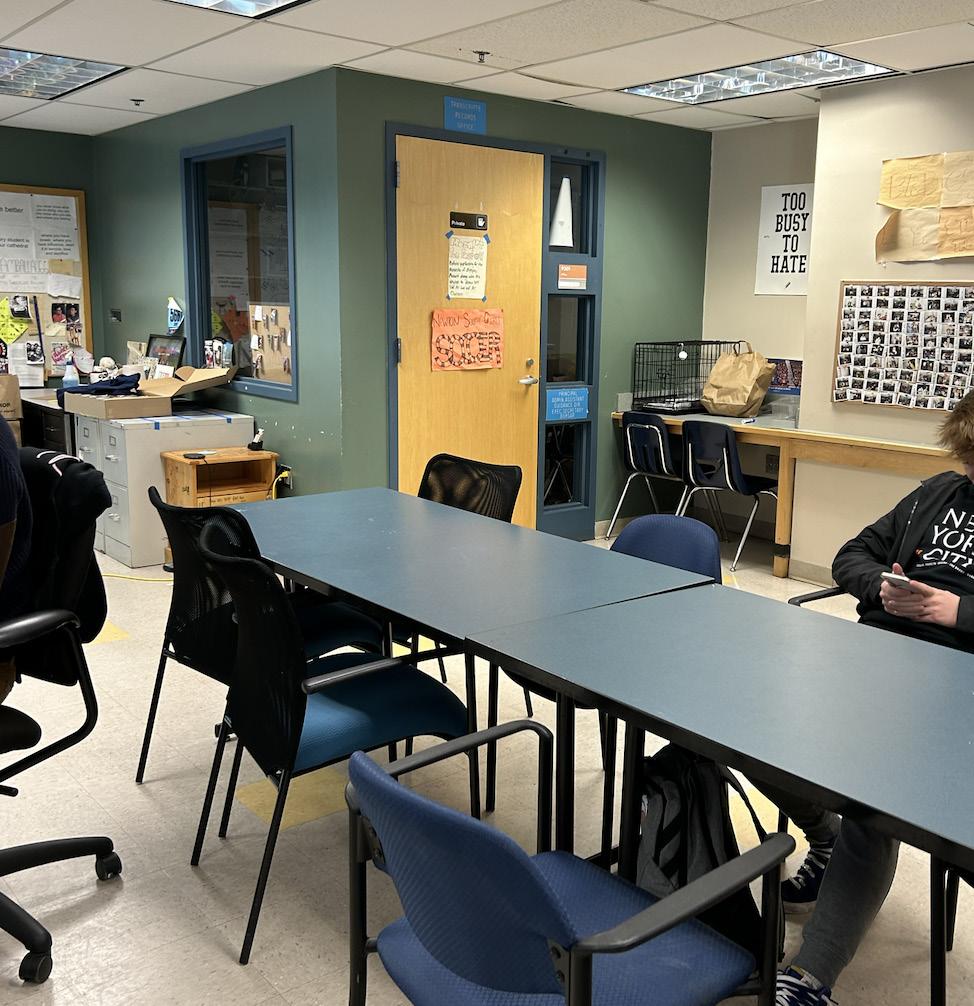
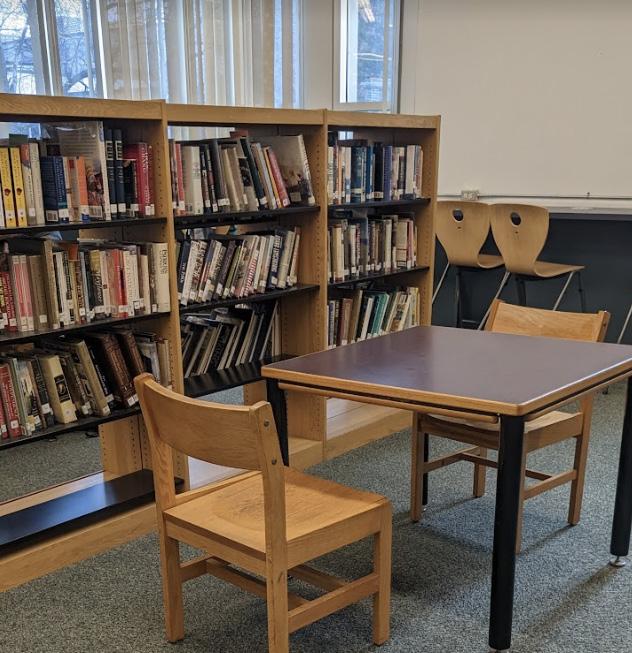

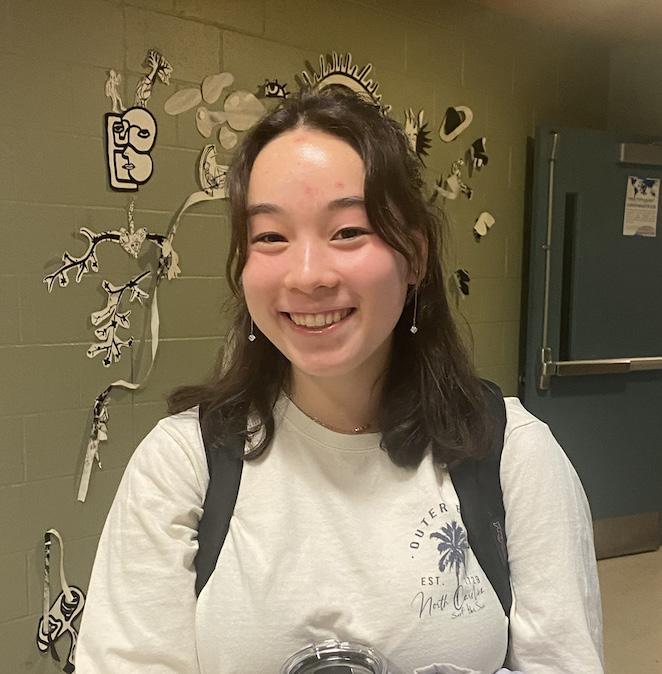


Hong class of '24
My favorite study spot is Mr. Lee’s classroom because it’s such a chill and welcoming environment. I can focus and hangout with friends.
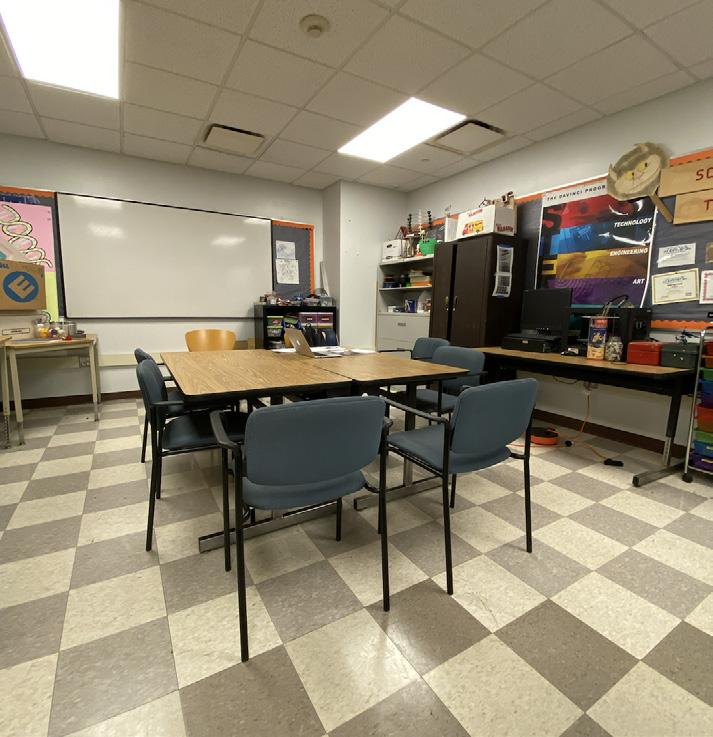


My favorite spot to study is the cafeteria because it’s a great spot to work with friends. Plus there is direct access to food.

 By Danny Diamond and Noa Levy
By Danny Diamond and Noa Levy
2022 was a proli c year for the lm industry. e pandemic resulted in a twoyear rough patch for theaters, but this year’s comeback proved that going to the movies is still a worthy experience, no matter how big or small the outing is.
Among all of the large superhero blockbusters, a number of movies managed to astonish audiences around the world with gorgeous cinematography and compelling storylines. Movies like “Doctor Strange in the Multiverse of Madness” and “Black Panther: Wakanda Forever” continued to highlight our culture’s hunger for superhero lms, but by far the most enthralling and authentic superhero lm of the year was DC’s “ e Batman.”
With its gripping, noir-esque detective story, “ e Batman” is a lm addictive in its own right. Coming o of projects like e Lighthouse” and “Good Time,” Robert Pattinson proved to be a good choice for the titular protagonist.

Alongside Pattinson, the incredible score from Michael Giacchino hits contrasting hopeful and dark notes just right for the lm’s tone.
e lm is an enthralling and original superhero lm that de nitely makes its way
to the top of this year’s list.
Another 2022 movie worth mentioning is the propulsive “RRR” — a three-hour thrill of non-stop Bollywood entertainment. “RRR” is a wonderful combination of all the genres one could possibly need. e lm follows two legends from distant worlds as they cross paths to ght British colonists during the mid 1920s.

e historical setting could come across as slightly dull, but the history is just the tip of the iceberg, as the movie has a much wider scope than that. It also has catchy music and great choreography. It is impossible to peel your eyes away from the screen until its nal moment. Indeed, it is a great installation to 2022’s lm canon.
Yet it is “Everything Everywhere All at Once” that takes the crown for 2022’s best movie. e dramatic science ction comedy lm proves concise and poignant, with equal doses of horror, zany comedy and familial drama.

Production company A24 manages to avoid the often illogical and pretentious tone of myriad multiversal movies, and the lm assumes its place among the remarkable installations in the Spider-Man-dominated
multiverse genre. Behind all of those features are exceptional performances from the ensemble cast.
Michelle Yeoh shines as Evelyn Wang, showcasing her incredible emotional rage, comedic timing and martial arts skills — a performance worthy of an Oscar. Ke Huy Quan as Waymond Wang, Evelyn’s husband, gives another empathetic performance, also award-worthy.
As said, 2022 was undeniably a great year for lm. e year was the rebound we all dreamed of, in which we nally experienced the excitement and thrill of returning to watch a new lm in theaters.
While there are certainly great movies on streaming sites, theater experiences bring audiences together and with literally all-encompassing views, viewers experience the unforgettable.
If the many outstanding lms released this year are any indication of the year ahead, movie-lovers can undoubtedly anticipate what’s coming in 2023.
All we can hope for are more “ e Batman”s,“RRR”s or“Everything Everywhere All at Once”’s — captivating lms that are ultimately mind-blowing experiences.

“What college are you going to? Do you have a boyfriend? A girlfriend? Your grades are good, right? Are you a vegetable lover now?”
Relatives’ faces blur together as questions come faster than you can process the words. With the arrival of the holiday season (and endless family gatherings), now really feels like a bad time to be an introvert. But don’t worry! Whether you’re hosting or visiting, we have
longer responses. Your family members probably don’t feel that same looming sense of awkwardness. When they ask a question, they aren’t just lling the silence — they care about your response. ey want to get to know you, for you. Be yourself! When you share details (think interests, hobbies), the conversation erupts.
If the thought of speaking more than absolutely necessary scares you, that’s okay! To avoid excess conversation, don’t leave any loose threads in your answers that your relatives can pull on. Be quick, either with little detail or including everything in one go.
Now, what if the party is already in session? Find something to do! Keeping busy is the most basic way to avoid awkwardness.
If you don’t want to interact with others all that much, read a book or engage in an otherwise quiet activity in a less busy area of the house. Be careful with the phone! Try to stay away from electronics for the most part, as they can make you seem disengaged from the group.
Before you know it, it’s dinner time! But what if you don’t understand the etiquette or the cuisine? is may be unnerving, as etiquette can be drastically di erent based on culture. Elbows on the table? Talking while others are eating? Where to put the napkin? Which fork or spoon is used rst? And don’t even get us started on chopsticks. But don’t be frightened — what is important is to be observant.
Look around the table; see what other members of your family are doing. And of course, if you’re lucky, and your host has sat you next to a close family member of yours, you can always ask for a little help. Asking may feel a bit embarrassing in an unfamiliar environment, but trust us, it’s better than the embarrassment of messing up.
You made it through dinner! Everyone is stu ed and relaxing on the couch. However appealing, try not to slump onto the couch in a turkey-infused coma, though; make sure to
amiable party kid you are.
It’s the end of the night, and everyone is leaving ( nally). Of course, you have to send everyone out with the appropriate goodbye. We all know how awkward it is to stand by the door while your parents are chatting the guests away, but think positively. We promise you’re not the only one who feels awkward.

When you ultimately begin to hear“Well, it’s about time…” or “My goodness, look how late it’s gotten!” your brain will naturally bring itself back into the moment, just in time to say a proper goodbye, which takes little mental energy. Just space out and keep a small smile on your face — you’re almost there! Hug when hugged, wave when waved at, throw in some “ ank yous” and “It was so nice to see yous” for good measure.
Finally, the last of your relatives have been waved out of the door. Congratulations! You’ve survived (hopefully unscathed!) an extended
some tips and tricks to help you prepare for these lively events.
Your family won’t be crashing your house forever. We promise. Take advantage of breaks — just because they’re your family and they only come once a year doesn’t mean you owe them every second of your time.
For many of us introverts, small talk is not our strong suit, and the prospect of lling an entire dinner with sparkling conversation can feel daunting. e best way to handle the pressure is to shift the conversation onto the other person. Shockingly, other people actually like to talk. Hard to believe, we know. Ask them a few questions to get them rambling about that one time with Joe back in ‘79, and you can nod and smile your way through the entire dinner.
For conversation starters, instead of asking “Do you like this?” try “How do you like this?” You’ll shift the weight of the conversation onto them.
On the ip side, don’t be afraid to give
Now, what if you’re ready to take the leap and branch out a bit more? If you’d like to participate in an activity with other people, try a family-friendly movie or o er to help with tedious tasks such as cleaning and cook ing (favorite grandchild points are like gold, people). Board games or charades are also perfect: you can be part of the group without having to contribute much verbally (except for shouting random words, of course).
Of course, your social battery will eventually run out. When this happens, scope out a quiet spot to retreat when you’re getting overwhelmed. Hallways on the edges of the social hotspot are cool, or even your room if the party’s at your house.
If you’re worried you’ll o end people with your disappearance, let your parents know you need a little break. ey can cover for you in a way even extended family can understand. Pull out a book or put in some headphones and listen to what you need before going back into the frenzy.
I don’t know when the “college process” really began. e name itself is ominous, bringing to mind the classic images of drawn-out applications and months of waiting. But as the light at the end of the tunnel approaches, I’ve begun to realize that I’ve only ever seen this so-called process as something for the future. Now, that future is here.
For however long college has sat in my mind, though, it wasn’t until fairly close to the early action deadline in early November that I decided where to apply.
ere are some schools, like Boston University or Northeastern or UMass Amherst, that I never really questioned, but that also never particularly drew me in with anything beyond their nearby presence and large yield from South. Only after some preliminary research, I opted, maybe on a whim, to apply to Harvard under its restrictive early action plan. As of writing, my decision comes out the day before this article’s print date.
I’m not exactly sure why I applied to Harvard. It has things that I like, from incredible research opportunities to enormous exibility
in course load and concentration, but I don’t know if I’ll commit should I somehow manage to get in.
For all its bene ts, nothing about the school necessarily jumps out at me enough to warrant an instant commitment.
Going into this application process, I thought that this kind of mindset — that no matter the admissions decision, I don’t owe any college my commitment — would prevent me from falling into the same trap of competitiveness and in exibility that drives so much of the toxic environment fostered at South around
admission to prestigious schools.
I think, on some level, that philosophy has worked out; I haven’t found myself developing anything close to a ‘dream school’.
But as deadlines approach and applications whittle down, I’ve realized that the issue isn’t just South’s environment; it’s how uneven the odds are within it.

ere’s a common perception that the primary competition for spots in a college class is within your high school — that you don’t have to be the best in the world, so long as you’re better than the people in your hallways.
Is this true? I have no idea, but it’s an easy enough narrative to believe.
And yet, its apparent simplicity — that it’s the best, the most quali ed, the most deserving students who get in — betrays the truth lurking beneath, and the truth that I’ve come to realize as my applications wrap up is that it’s not the best who wins.
ink about it. For all of the enrichment that South o ers, external factors like socioeconomic circumstances, parental education and private sports that cost hundreds of thousands
to pursue, to name just a few, play just as large, if not larger, roles in admissions.
Take legacy status: no matter how hard you work, whether a parent or grandparent attended the school you're applying to incredibly increases your odds. Harvard’s legacy admission rate, six times its overall rate, is evidence enough.
Who’s to say that a legacy who gets in worked just as hard, is just as smart or has the same quali cations as someone without that boost?
And this plays into the biggest question I’ve encountered throughout the college process: who deserves to get in?
e answer is simple: it depends.
But to act as if all admissions are the same — as if the double legacy’s success is somehow equal to that of the rst-generation student, or that the public school basketball player deserves the same chances at recruitment as the fencer or rower, who could a ord the enormous costs of competition — ignores the inequality present, and just how much so many at South capitalize upon it.
Admission doesn’t mean quali cation.
For many of us introverts, small talk is not our strong suit, and the prospect of lling an entire dinner with sparkling conversation can feel daunting.
Who's to say that a legacy who gets in worked just as hard, is just as smart or has the same quali cations as someone without that boost?
As an eighth grader in 2008, current long-term history substitute Elise Brown watched in awe as millions of young voters carried Barack Obama to victory to become the fth youngest president elected in U.S. history.
At that moment, they realized that it was possible for young people to hold prominence within government, so after middle school, they got involved: volunteering for campaigns and nonpro ts, spreading information on key issues throughout their community and expanding their interest and investment in national and community politics.
Brown became a teacher after college, and hopes to further incorporate their passion for civic engagement and politics into the classroom and mold the new generation into active and conscientious citizens.

“I grew up in a suburb of Portland, Oregon,” they said. “I saw among community organizers, even among state legislators, this drive of ‘change is real, hope is real.’ You need the practical idealism of young people to make that possible.”
Although older generations have historically dominated politics, young people fueled by frustration at slow political processes and con dence in their own political power have begun nding their voices, both nationally and within their own communities.
e American electorate has only gotten younger over time: in 2020, the Pew Research Center found that the millennial generation born in the 1980s and 1990s now outnumbers the Baby Boomers born in the mid-1940s to 1960s, and as more members of Generation Z enter adulthood, the electorate is increasingly lled with younger and younger voters.
Still, history and comparative government teacher Jamie Rinaldi said, the bulk of political power remains concentrated in the hands of senior citizens.
“One odd thing that I've noticed about our political leadership in this country is that it's getting older and older and older; in political science, we call it a gerontocracy [a government of senior citizens]” he said. “We've gone in a direction where very old people have a monopoly of political power in this country.”
Within the last 10 years, Presidents Donald Trump and Joe Biden set records as the oldest elected presidents; Trump entered o ce at age 70, followed by Biden at 78. e landscape of Congressional leadership is similar: Speaker of the House Nancy Pelosi is 82, while Senate Majority Leader Chuck Schumer is 72.
For the sitting 117th Congress, according to additional research by the Pew Research Center, the median age of senators is 64.8, while the median member of the House is slightly younger, at 58.9 years old.
However, the 2022 midterm elections proved to be a turning point for young people in national politics. In Florida's 10th Congressional District, Maxwell Alejandro Frost became the rst member of Generation Z to be elected to Congress, at age 25.
Estimates from the Center for Information and Research on Civic Learning and Engagement at Tufts University found that approximately 27% of voters between the ages of 18-29 voted in the midterm election this year, the second highest voter turnout among voters under 30 in the past three decades.
While midterm election results typically hurt the political party of the sitting president, Republican gains were dampened this cycle. Republicans took a weaker control of the House of Representatives than expected, and Democrats expanded their majority in the Senate.
Brown said that young voters helped to reverse this norm.
“ ey saved our democracy,” they said. “It's common wisdom that during a midterm election, the President's party gets a backslide in popularity, [but] the fact that there were so many states with these fringe MAGA [Make America Great
Recent events, history teacher Zakarias Gomes said, have led more members of Gen Z to take an interest in civics. e Capitol insurrection on Jan. 6, 2021 o ered young voters a place to start.
“ is is a nation whose democracy has been threatened, and it's something that people want to voice their opinions on,” he said. “ e Jan. 6 insurrection is one of the things that many people and younger people saw as a visible threat to the democracy of our nation.”
Research from the Harvard Kennedy School’s Spring 2021 Youth Poll indicates that since the election of Barack Obama, young Americans have become signi cantly more likely to be politically engaged.
is
“Too many people in my age group inherited this idea that government just works,” he said. “[Gen Z] has inherited the idea that the government only works if people are active and participate. [Gen Z has] been witness to incidents of mass violence, police killings, a sense of economic uncertainty and the prospect of global war. ese were things that were largely either absent or invisible in the 1990s, so your consciousness as a generation is very di erent from mine. at positions you better to be more active in politics.”
However, the sheer amount of exposure to bad news has also pushed students away from maintaining a sense of political awareness. Senior Jessica Li said that she used to be more up-to-date with current events, but removed herself because of the negative repercussions she felt from constant exposure to negative coverage.
“I used to be far more in touch with politics at some
Again] candidates that got beat, and the fact that [the backslide] didn't happen to the extent it usually does, speaks to the power that Gen Z voters know that they have.”trend, Rinaldi said, stems mainly from Gen Z’s greater exposure to national and global crises and insecurities, which in turn fuel a greater sense of urgency toward participation in government.
Gen Z steps onto the national stage after midterm elections and paves the way for future youth engagementBrown sits and glances at the American ag in Rm. 2309
point during the pandemic, [but] I found it very overwhelming and stressful to continue to keep up with,” she said. “ ere was a point a couple of years ago … where it became a lot to tune into the news.”
Li also said that a lack of outcome produced by local civic groups pushed her away from participating more within the community.
“I used to volunteer at a couple of di erent local organizations … But a lot of times the most passionate people about a certain topic or mission are not the most educated or prepared to be leaders in this type of arena,” she said. “If the leaders don't know what they're doing, then the organization can't function and nothing ends up getting done. I put in a lot of hours to a couple of di erent organizations and basically nothing got done, [which] was just very frustrating.”
Members of Gen Z see similarly discouraging signs within the broader structure of government as well. In the Harvard Kennedy School’s poll, over 40% of young people agreed that “their vote doesn’t make a di erence,” more than 1 in 3 believed that “political involvement rarely has tangible results,” and 56%
agreed that “politics today are no longer able to meet the challenges our country is facing.”
Newton’s city government is not free from such a trend. Junior Nathaniel Scharf said that as part of the School Council, he has tried to work with sta members and local leaders on improving particular aspects of South, but has found his work slowed down by bureaucratic processes and a perceived disinterest from adults.
“I know a lot about the city, but I don't feel very engaged with it because they're very unreceptive to changing anything, even if it's clearly a positive change,” he said. “Anytime you really want to change something at school, we have to pass it by the School Committee, and they just never want to do it. ey always have a reason not to do it.”
weary adults than teenagers. Until he became eligible to vote, Bahar never had much interest in politics, voting or current events. However, just this year, his perspective shifted even if voting may have a negligible e ect on his day-to-day life, he said, its greater impact made going to the polls worth it.
“From 9th to 11th grade, I ignored all of the elections and voting because I wasn't allowed to vote,” Bahar said. “Voting doesn't a ect me nearly as much as it a ects other people because I'm a white male. However, [the voices of] other people who cannot vote matters, and I'm voting for them.”

In order for a democracy to function properly and all voices to be heard, young people must participate in government, history department head Jennifer Morrill said.
“We live in a democracy and our democracy relies on people understanding what's happening and participating,” she said. “If people don't participate in our government, our government won’t function properly, and so you want young people to see themselves as having a role in government. It's encouraged for all people.”
History teacher Michael Kozuch said the power lies in local politics.

“Being engaged in your community, your state and your nation is not just about voting, it's about the everyday ways in which we think about … issues that make a di erence in your life,” he said.
e mistake that many people make is that [they believe that] presidential elections are the things that matter. Yes, they matter, but if we think about what actually impacts people on a daily basis, it's often city government and the kinds of things that are being done at that level.”
Even before reaching voting age, many students at South have found ways to get involved in their community. Senior Sasha Fine said that her family’s connection to political involvement inspired her to get involved as well.
“I have been volunteering for grassroots [organizations] and have been just really involved in politics since I was nine with my mom,” she said. “My mom is involved in politics; I de nitely got [my] interest from her … she taught me a lot about politics and how to make an impact when I couldn't vote.”
On the other hand, freshman Alyssa Xia said her family’s lack of connection within the community motivated her to become interested in politics. By staying informed, she can improve their connection.
“My parents are immigrants, [and] in China, everybody minds their own business, but in the U.S. because there's local stu , they never learned how to stay connected,” she said. “Even though my family might not feel like a part of the community, I de nitely want to make sure that I feel like a part of one, and maybe someday I can help them feel like a part of one.”
When young people are more engaged, they can see themselves as politicians, which only motivates them to become more involved, Li said. A positive feedback loop ensues.
“Having more young people in politics in general would encourage a lot of people our age to engage more because then it's actually impacting our futures instead of people who just got voted in and are going to die within like ve years,” she said.
Ultimately, Xia said, getting, and staying, involved lets young people make the world one they wish to see.
To senior Dan Bahar, voting felt like a minute contribution to a far-o democratic process, and an activity meant more for
“Everybody is ghting for what they believe is the best for them or for their family or whoever they need to protect,” she said. “As we're heading into adulthood … we do have to think about what kind of future we want, what we want our country to look like and what it is we want our home to feel like.”
As we're heading into adulthood … we do have to think about what kind of future we want, what we want our country to look like and what it is we want our home to feel like.
Alyssa Xia class of '26


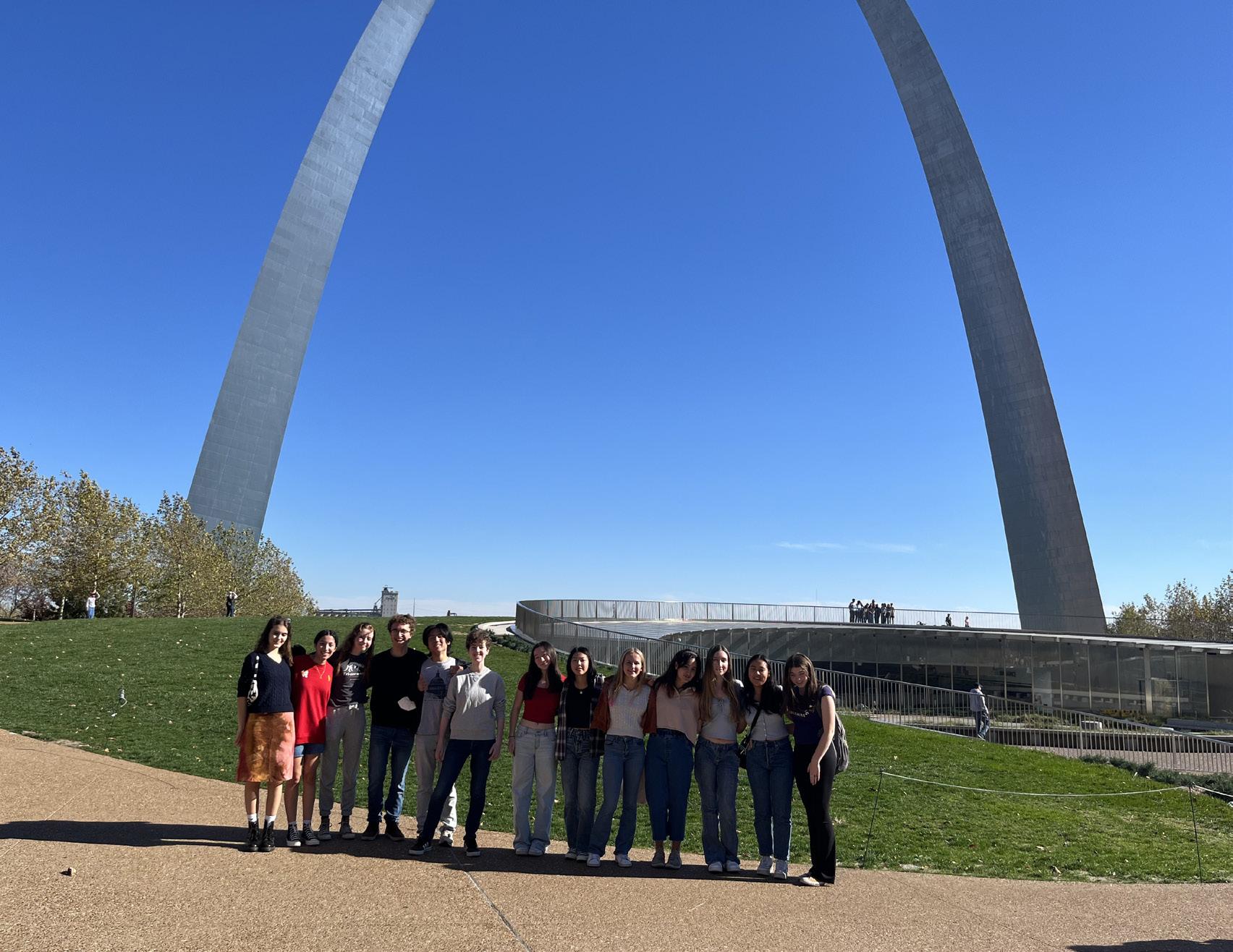
Between Nov. 9-13, The Roar, along with two other South publications, attended the National Scholastic Press Association's annual conference.
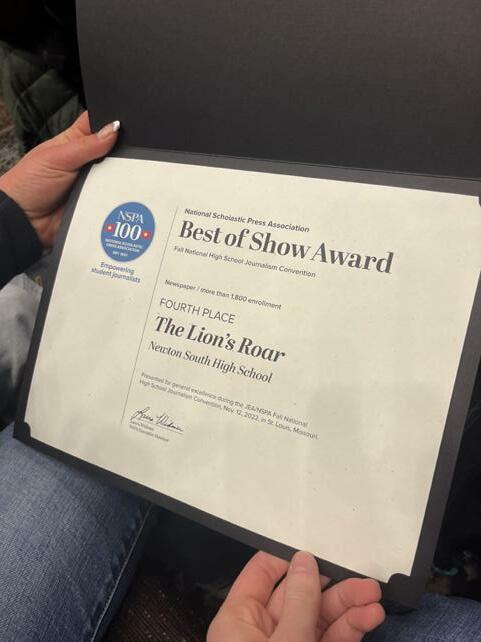
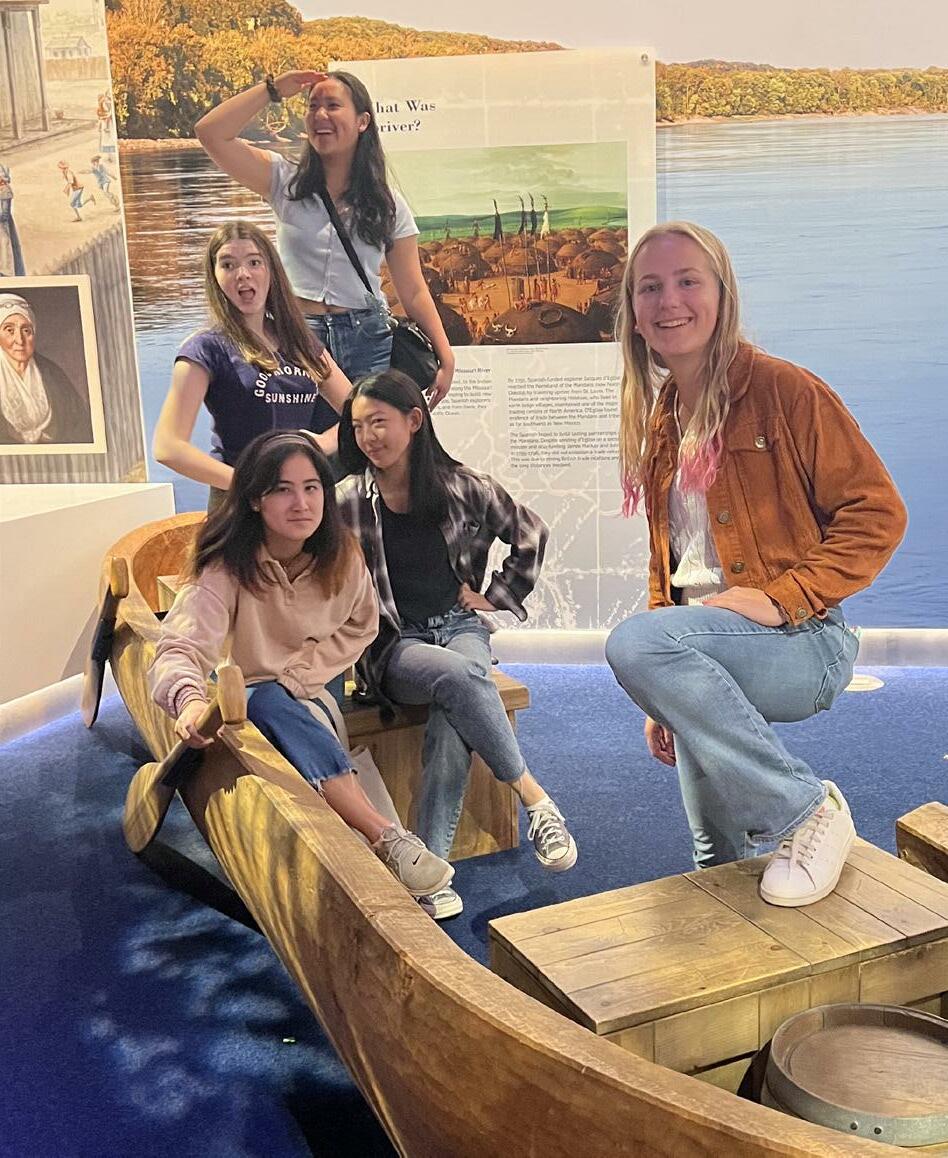
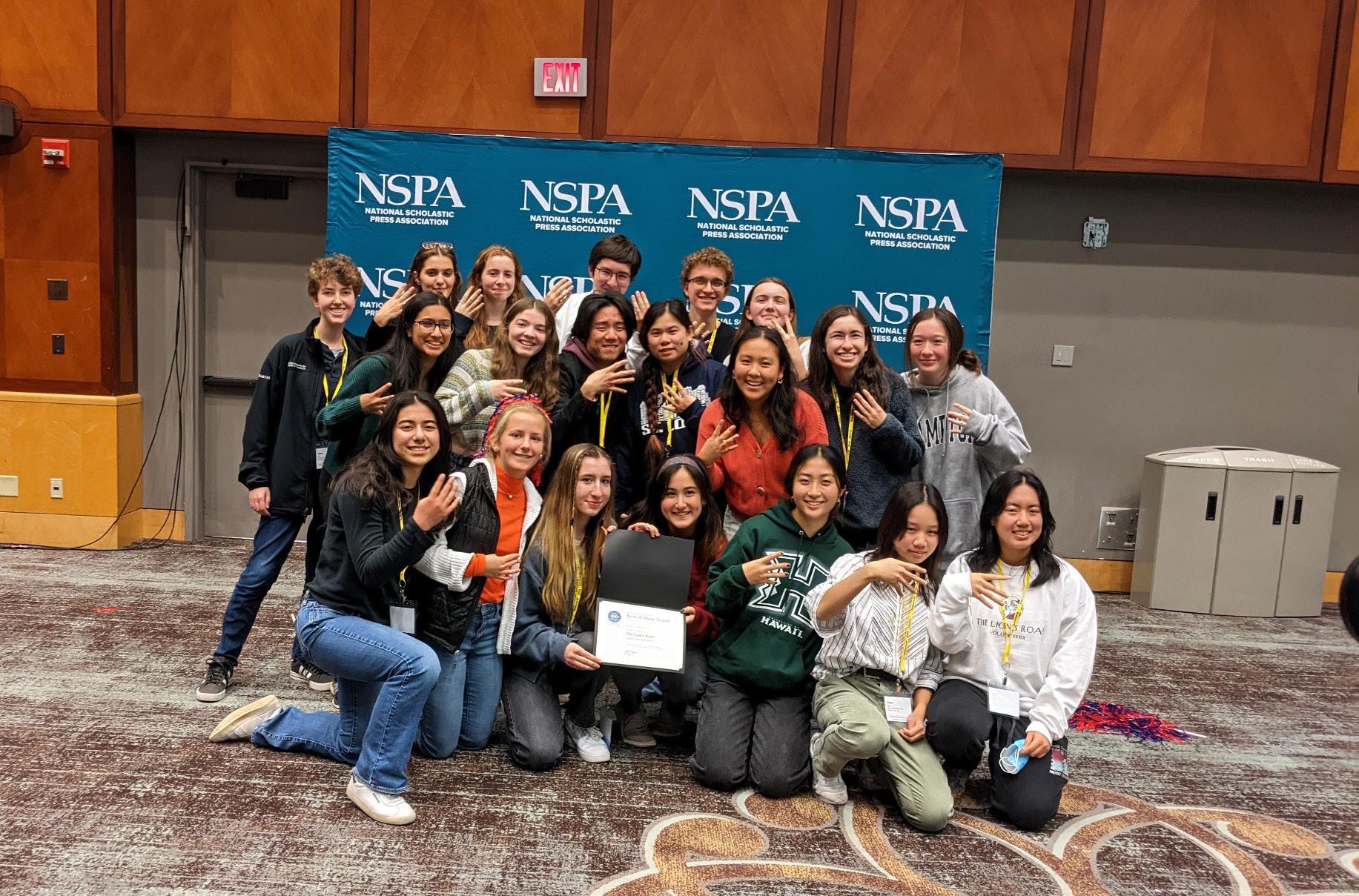
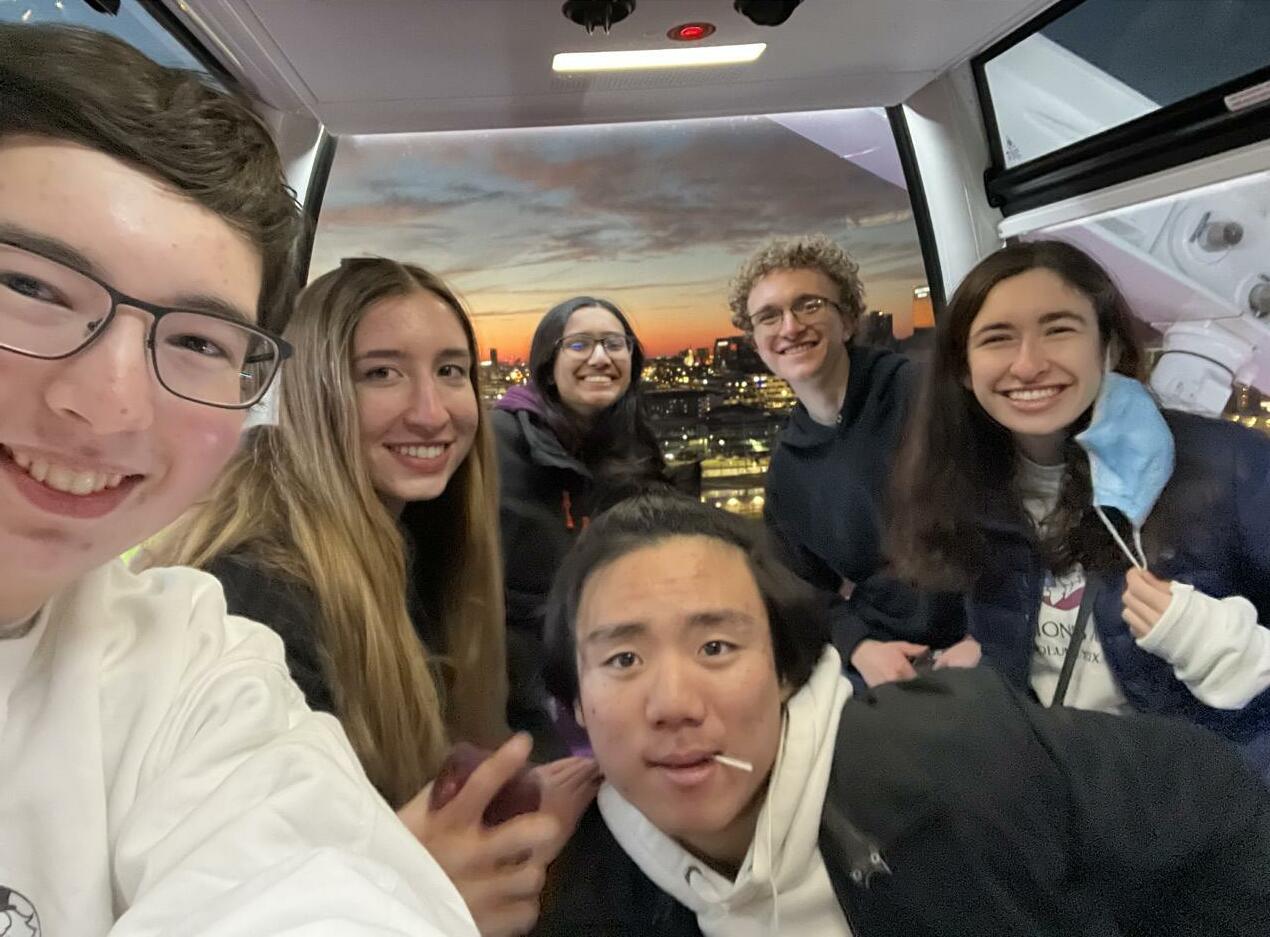 Our paper was awarded 4th Place Best in Show!
Our paper was awarded 4th Place Best in Show!
As the last school day before winter break arrives, the hallways are buzzing with excitement. While class o cers pass out countless candy grams and Secret Santa exchanges ll the classrooms, all of South’s choirs join in on the action, traveling around the school caroling.
Chorus teacher Ben Youngman said that caroling before winter break is a long-held South tradition.
“As far as I know, it started the very rst year in 1960,” he said. “[We] would have all of the choirs singing and then all of the alumni singing and hundreds of people walking through the halls.”
Senior Violet Lanciloti is one of the leaders of Festival Singers, a student-led, community service choir colloquially known as “Festies.” She said that South’s tradition brings the caroling community together.
“ e alumni often come back, so it’s nice to see people whom I haven’t seen in a while and also to just go around the school and sing, because I love to sing,” she said.
Festies also travels to senior living facilities to sing for the residents. Freshman David Rosemberg sings in Vocal Ensemble and Festies, and he said he loves the group for both the people and their mission.
“Festies [is made of] people who really choose to devote their time, and we go to places where we think we can help,” he said.
is will be the rst time many choirs return to caroling since the start of the Coronavirus pandemic. Sarah Hayward, a junior in South’s acapella group Newtones, said that the pandemic made singing di cult.
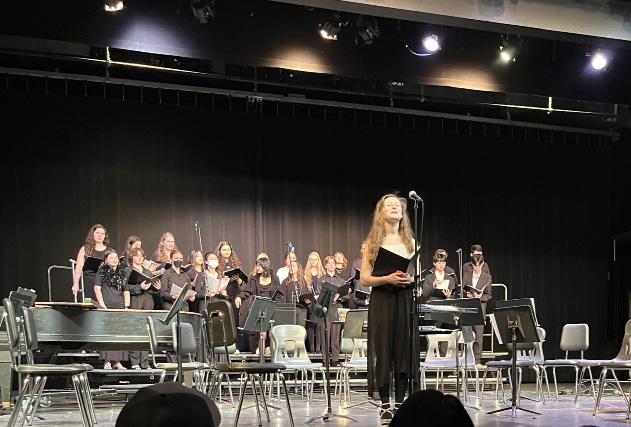
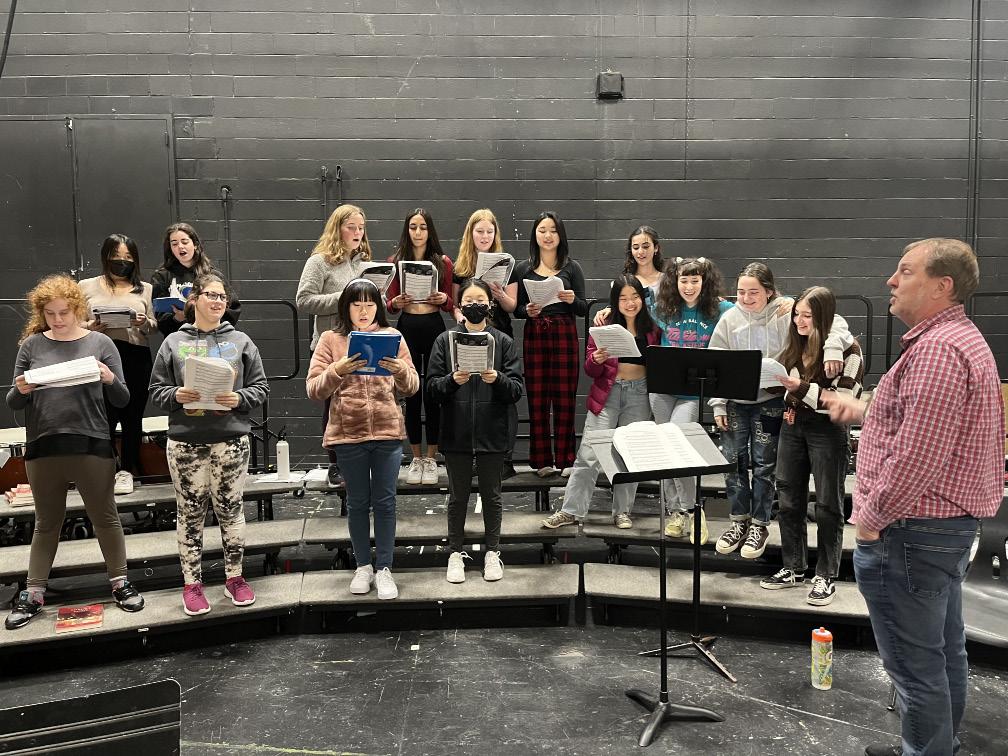
“COVID kind of turned our world upside down,” she said. “[Newtones] took a lot of precautions like sitting six-feet apart [and] we couldn’t sing inside, which a ects the acoustics, so it was harder to hear each other and blend and do that traditional acapella sound. It was still a bunch of fun, but it’s a lot better now.”
Lanciloti said that technical aspects aside, she is just happy to be caroling again.
"COVID made it so that [Festies] didn’t really meet as often, and it also prevented us from singing at senior living facilities for about two years,” she said. “We are very happy to be bringing it back this year."
In addition to caroling at South, Newtones carols door-to-door and at events like Christmas parties. Hayward said that caroling not only profoundly impacts the singers, but also those who are enjoying the music.
“It just brings some light to your day, especially if you’re having a tough day, or you’re lonely around the holiday season, or you’re not getting to see your loved ones. It’s a really nice reminder that there’s still so much to be happy about,” she said.
Newton isn’t the only place in the Greater Boston community that carols. Leigh Larkin
teaches music at Woodland School, an elementary school in Weston, and she has caroled for her whole life. She said that caroling with her mother and their church youth group at a nursing home as a child remains an impactful memory.
“[I remember] seeing my mom after [caroling in] one of the person’s rooms, and she started crying,” she said.“I think [she] was thinking about her future, and how someday she might be in a nursing home, and what a nice thing it is that we’re doing this for people.”
Hayward said that in addition to creating space for memories, caroling can help strengthen relationships.
"I think it brings us closer as a group because sometimes, caroling can be kind of grueling in itself, the way you’re just standing outside in the cold and it’s snowy and gross … but it’s really fun getting to spend the whole day together and making a lot of memories," she said.
Youngman’s favorite carol is rooted in his childhood and family, he said.
“I’m partial to ‘O Little Town of Bethlehem,’ because it was one of those songs that my father loved, and my father loved it because his father loved it, and it would make my grandfather cry when we sang it,” he said.“[Good carols] are the ones that evoke memories and family.”
Larkin said that she enjoys sharing the art of caroling with people of all ages.
“Last year, I went to this winter fest and there was a high school group that was caroling,
and it was really fun to see them singing,” she said. “My kids loved it, and I think it’s for all ages … It’s fun, and everyone appreciates it.”
Ultimately, caroling is a celebration of winter regardless of culture or religion, freshman Clare Cho, a member of Vocal Ensemble and Festies, said.
“[Caroling is] inclusive because a lot of people just think of Christmas when it comes to winter, but there can also be Hanukkah and [other] winter songs,” she said.“To make a good carol, you have to think about winter spirit in general, and not just a speci c part of it.”
[Caroling] just brings some light to your day, especially if you're having a tough day, or you're lonely around the holiday season
. . . It’s a really nice reminder that there’s still so much to be happy about".
No matter the temperature outside, he can be found roaming the halls in ip- ops and the occasional dinosaur costume or in room 2306, teaching ninth grade English and the senior elective Asian and Asian American Literature. Well known for his costumes, humor and energy, English teacher Matthew Wilson is beloved by both students and teachers.

With prior experience in law and personal training, Wilson’s professional background provides a unique perspective to his teaching style, English department head Brian Baron said.
“He started doing this later than most of us did,” he said.“He’s lived a whole life before he
became a teacher, which I think is really helpful.”
Ultimately, Wilson’s love for the classroom environment led him to become a teacher, he said.
“It's a lot of fun. e moment that you see the light bulb go o on top of a kid's head is one of the best moments ever,” he said. “For me, watching my students as a whole grow from September to June is just an amazing process.”
School adjustment counselor Sarah Gentile said that Wilson’s passion for teaching is inspiring.
“Mr. Wilson is an exemplar of really holistic, supportive teaching. He makes time for all students and he puts in 110 percent,” she said. “ e best thing about working with him is just the energy and passion he brings to his craft. It makes me want to bring more energy to my own work.”
joyable and easier for the students,” Chan said.
Wilson is deeply committed to his students, English teacher Jenny Robertson said. She has worked with him for the past six years.
“Nothing really makes him angry. He’s a very chill dude,” she said.“But he cares so deeply.”
He brings this dedication to every class, freshman Sophiya Jacobs said.
“He’s a very fun teacher,” they said. “And he makes sure that you know what you’re doing.”
Baron said that Wilson’s aura transcends classroom walls.
“He’s a wonderful person,” he said.“He's an all around good-hearted, empathetic, charismatic presence.”
Gentile, too, said she appreciates Wilson’s supportive and humorous contributions to the South community.
"He's is able to understand what students are going through. He's able to have that understanding and apply it to his class and make it more enjoyable and easier for students."
Chan class of '23For his fourth year at South, Wilson is teaching Asian American Literature, a course he started in 2018 to improve Asian and Asian American representation in English classes.
“I wanted to make sure that, in a school where almost 25% of the kids identify as either Asian or Asian American on some level, I wanted them to be able to see themselves in the stories that we read, to see themselves as the heroes,” Wilson said.
Isaac Chan, a senior in Wilson’s Asian and Asian American Lit class, said that he is grateful for Wilson’s teaching style, which balances fun with a deep care and understanding for his students.
“On a personal level, we connect a lot, and he is able to understand what students are going through. He's able to have that understanding and apply it to his class and make it more en-
“I love his humor and his costumes and the sense of community that he builds in every class that he teaches,” she said. “He brings a sense of true acceptance and true validation and he really wants each of us to shine in our own authentic light.”
Chan’s favorite costume of Wilson’s is Oscar the Grouch from Sesame Street.
“He wears costumes every spirit,” Chan said.“He wore an Oscar out t one of the times, and every time he moved, he would jiggle up and down. It was really funny.”
rough all of his experience in teaching, Wilson said that ultimately he hopes to support his students’ mental health.
“I would I hope that my biggest contribution is that I've lowered the stress level that my students have experienced,” he said, “On a more silly note, I would hope that people will just remember the costumes.”
First envisioned by photography teacher Bob Bouchal as a time for both students and teachers to roam the halls and enjoy live music, Passin’ Time has come a long way since its creation.
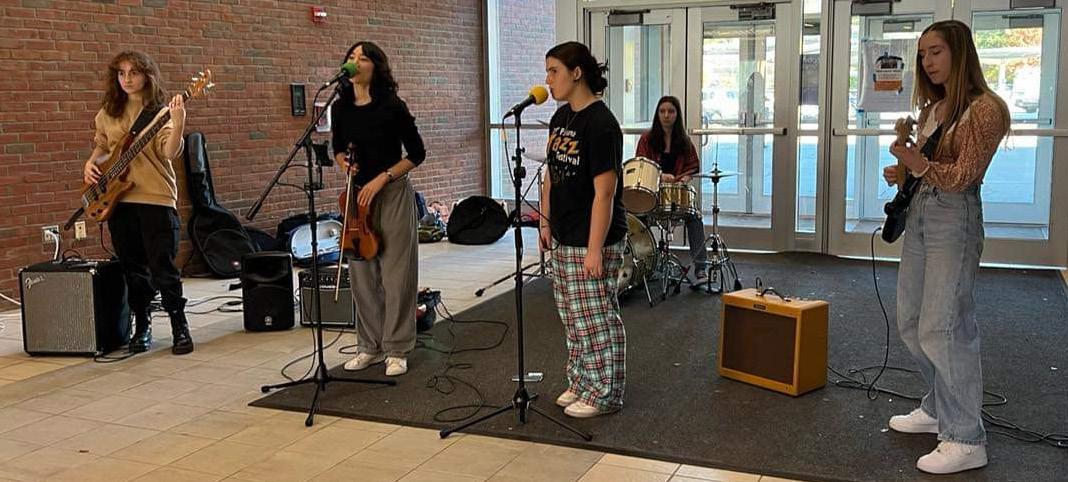
Now, English teacher Alan Reinstein manages the tradition, which occurs one Lion or WIN block per term to provide a much needed in-school break to the South community.
Passin’ Time’s inclusive nature gives South’s bands a unique opportunity to perform in front of a live audience, Reinstein said
“It’s a great way for bands and performers to get low-stakes performance practice,” he said.
At a Passin’ Time in May, indie rock band Nervous Girls performed for their rst time ever. Senior and bassist Hannah Namini said that Passin’ Time has been an easy way for her band to get experience in front of a live audience.
“If you mess up, it’s whatever. But it’s
still good to perform in front of an audience,” she said.
Freshman utist Eli Scharf rst performed at Passin’ Time in November. ough he’s played ute for six years, he said that at rst, performing publicly was daunting.
“I love creating music and if I can share what I practice and what I create with other people, I think that's fun,” Scharf said. “I felt that more than the nerves of having everyone see me.”
Sophomore and guitarist Ezekiel Deveaux-Turner plays in a jazz rock band with freshmen Bennett Frost and Yasen Dimitrov. He said he participates in Passin’ Time to both experience performing publicly and to advertise his band.
“I want to expand my talent, get in front of stages, get used to that since I'm probably going to do it a lot more,” he said.
Frost, a drummer in the band, said that the opportunity to perform lets him share his personality with the school community.
David Weintraub English teacher“[Passin’ Time] gives you a chance to show people what you're passionate about, what you love to do,” he said.
Freshman vocalist David Rosemberg said that he hopes Passin’ Time will help him meet people in the South community.
“Getting people to know me as someone who sings is more than having to go up to them. “I’m just excited to see people,” he said.
Music serves as a form of stress relief for Rosemberg, and Passin’ Time has given him a chance to share that with his classmates.
“Sometimes school gets tough and stressful, and I feel like singing and writing songs is sort of a way to put my own emotions into words,” he said.
English teacher David Weintraub regularly performs on the drums and guitar at Passin’ Time, in a band with other teachers. He said he enjoys being an audience member, too.
“I just love seeing my students in that
context, seeing how even if they may be quiet in class, they're very loud when they get on the mic and you see di erent sides of their personalities,” he said. “[Passin’ Time] brings a lot of creativity and joy into the halls.”
Similarly, Namini said she enjoys seeing the variety in others’ acts.
“I remember a teacher a few years ago had brought in their own, traditional instruments, and it was really cool,” she said.
Rosemberg said that part of the importance of sharing music is the challenge for musicians to step out of their comfort zones.
“Maybe [Passin’ Time] was created to give a voice to the people who wanted to share their own music but were too scared or didn't nd the right opportunity,” he said.
Weintraub said he likes how Passin’ Time is unique to South.
“What other school can you have abstract, noisy, synthesizer improvisations with psychedelic backing between math and history class?” he said. “[Passin’ Time] is so quirky and distinctive and just brings a lot of creativity and joy into the halls.”
“I just love seeing my students in that context, seeing how even if they may be quiet in class, they're very loud when they get on the mic and you see di erent sides of their personalities."Isaac photo by Maureen Caul eld
“Mr. Wilson is an exemplar of really holistic, supportive teaching. He makes time for all students and he puts in 110 percent.”
Sarah Gentile special education counselor
“[Passin’ Time] gives you a chance to show people what you're passionate about, what you love to do."Bennett
From late nights rehearsing for South’s 2011 production of “Hairspray” to starring in “Richard III” at New York City’s SoHo Shakespeare Community, ‘11 graduate Je rey Alkins has always had a passion for theater.
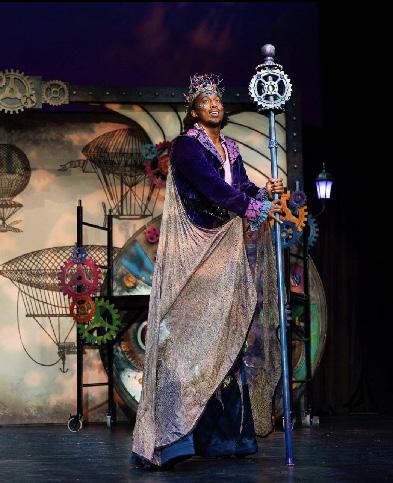
A three-season athlete and three-season captain as a senior, Alkins did not expect to get involved with South’s theater department. When he “o cially” joined South Stage his senior year, he starred in “Hairspray” and acted in the Senior Showcase.
He went on to attend St. John’s University and the American Academy of Dramatic Arts, where he discovered his love for theater.
Still, Alkins said he was uncertain about pursuing theater as a full-time career. Once he decided though, he went all in.
“While I was in college, I fell in love with theater, and the reality is if you are trying to make a living doing live theater, Broadway is where you want to be,” he said. “So 2015 was when I settled in and decided that live theater is what I wanted to do, and if I wanted to do it, I'd want to do it on the biggest stage I can.”
Alkins said that his parents were not always on board with the idea, but he now considers them his biggest supporters.
“I think [it] came from fear. To try and be an actor in New York City is a very daunting thing. I had a very nice life set up in politics before I decided to become an actor, and so I
think that their concern was whether or not I was going to be able to make a living or if I was going to be okay,” he said.
“But now apparently there's a copy of my ‘Hairspray’ DVD circulating that my dad is still showing people, and my parents are easily my biggest supporters and biggest fans.”
Katani Sumner, Alkins’ METCO counselor during his time at South, still attends his performances. She said that despite Alkins’ late start to theater, it’s been incredible to see him grow as an actor.
“He's just amazing. I'm just so excited that I've been watching him ever since,” she said.“I expect to see him get big — whether it's Broadway or if he wants to do classical theater in London,. I'm convinced he will get there.”
Fine and performing arts department head Je Knoedler said that Alkins has been a natural since he rst stepped foot on the stage.
“I remember his rst South Stage production,‘Hairspray,’” he said.“He seemed really comfortable on stage, con dent and natural.”
As one of few people of color involved in South Stage, Alkins said he rarely felt excluded. He made some of his closest friends through the theater department.
“South Stage was very inclusive,” he said.
“It was actually one of the rst places where I felt like I really t in and belonged. I used to hang out in Mr. K's o ce and hang out with a bunch of kids who were in South Stage, even
[when] I was not ... and so they were a lot of my friend group.”
Still, Alkins said that he struggled with some aspects of being the only Black male within the theater department, especially when it came to balancing his responsibilities between indoor track and theater.
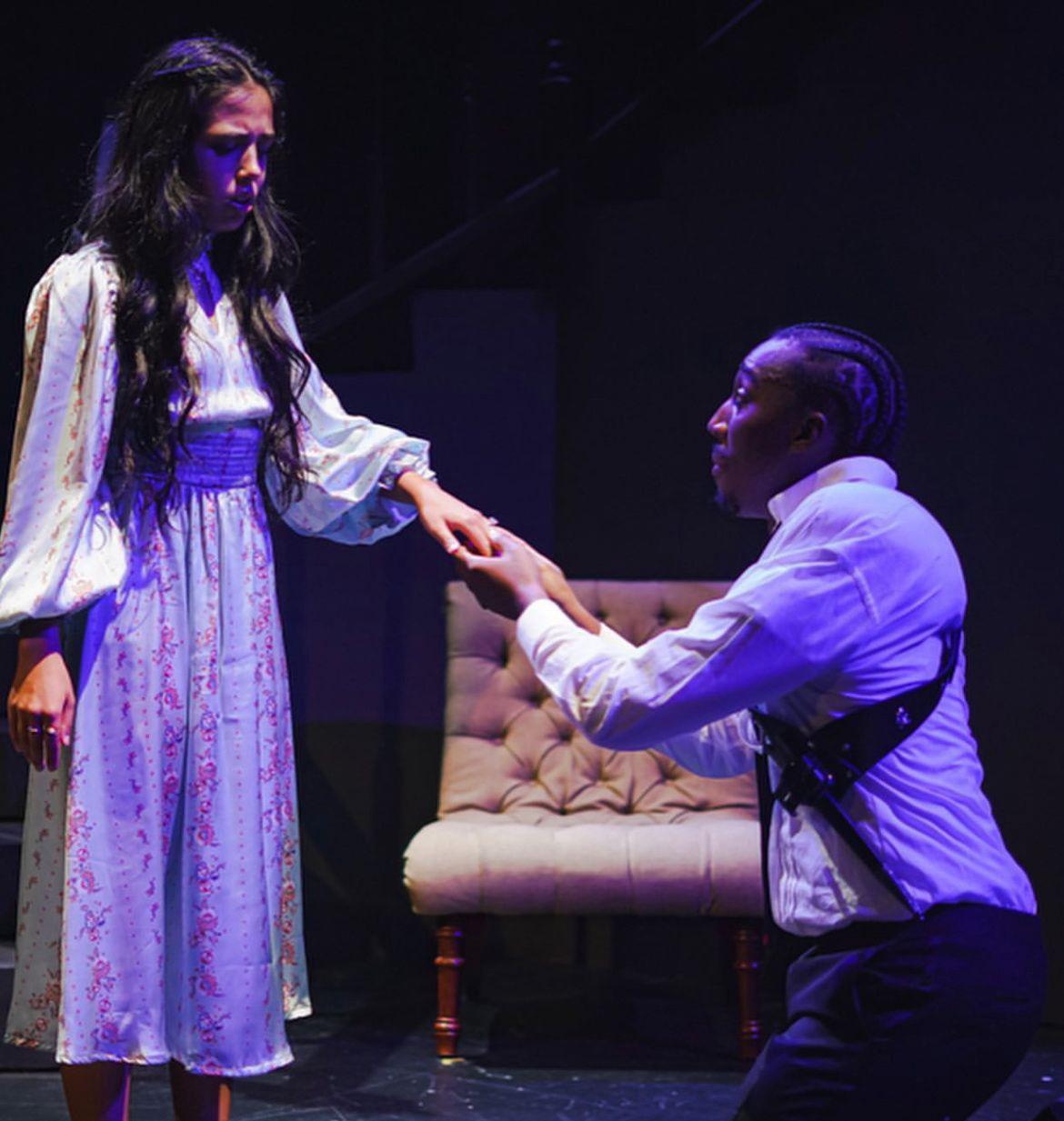
e most di cult part of being a part of South Stage was that my introduction into it was not clean and easy,” he said.“In my senior year, I was kind of given the ultimatum to step down as captain or quit the musical. And being something like ‘Hairspray’ where diversity was needed, being one of the only Black males in school who did act and sing and dance, I knew that quitting was going to put the show in a di cult position. Having to choose between doing this thing that could be wonderful, while also giving us something that I had spent my entire life working towards, was very di cult.”
To young actors, Alkins said to remember that as long as you have passion for your craft, the bene ts of following your dreams will always outweigh the negatives.
“If you can do anything else in the world [besides acting] and be happy, do that, because it is not something for the faint of heart,” he said.
“It is not an easy career by any means, so I always also like to pair that with my worst days as an actor are better than my best days doing anything else in the world. I quite literally get paid to live my dreams every single day.”
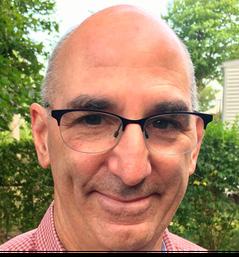
Recently, rapper Kanye West was suspended from Twitter for tweeting an image of a swastika — on the same day that he appeared on a podcast and said,“I like Hitler.” is followed a tweet in early October in which he wrote that he was “going death con 3 ON JEWISH PEOPLE.”
In October, professional basketball star Kyrie Irving tweeted his support for a 2018 movie called “Hebrews to Negroes: Wake Up Black America,” which includes claims of Holocaust denial and of an international Jewish conspiracy, the belief that Jews throughout the world, although making up only 0.2% of the world population, have developed a powerful circle of in uence that veers towards world domination.
As a Jew, I’m intrigued by two elements of what seems like an expanding freedom to speak out against the Jewish community. First, this is a reminder to many American Jews that no matter how much at home we feel within the American community, we still subconsciously see ourselves as outsiders, never completely safe among our non-Jewish neighbors. To many people who are not Jewish, this insecurity seems groundless (and there may be Jews reading this for whom this statement is foreign), but a long history of being excluded and feeling unwelcome can engender skittishness about one’s home that may never fully subside.
at’s what I think is at the heart of concerns about recent statements from popular entertainers that seem to give liberty to antipathy toward Jews. Seen as hypersensitivity by some, the fear that not tting in will lead to discrimination or even expulsion is deeply a part of the Jewish psyche, something nonJewish people may not fully appreciate.
is leads to my second point of interest. Because this feeling of being an outsider binds me in sympathy with other marginalized groups, my white racial identity giving way to my Jewish one, the antisemitic statements from two prominent African American celebrities make me worry (even while acknowleging questions about Kanye West’s mental wellness) that perhaps other members of the Black community also don’t see Jews the way many of us see ourselves — as partners in the ght against a white supremacist ideology that threatens democratic and humanistic principles.
In addition, I think that those Jews who are also white, like me, may be forgetting that our whiteness is a signi cant feature of our American experience that o ers us opportunities that are blocked to others. is may cause resentment from some people of color who hear white members of the Jewish community expressing solidarity with their struggles for social justice.
So where does this put us as a community of Newton South Lions? My message to people who aren’t Jewish: Be aware that many Jewish students and sta members beside you may feel their ancestral history of otherness and alienation deeply, even if they aren’t able to articulate it.
And to my white Jewish family members: we should acknowledge that our white racial identity is also a prominent feature of our place within the American community, a feature that may even dominate others’ perceptions of us and separate us from BIPOC community members, even though we wish it didn’t.
Seventeen Argentine students from the Colegio del Carmen School in San Rafael, Argentina arrived in Newton on Nov. 5th for a two-week exchange to improve their English, learn about the United States and make lifelong friends.

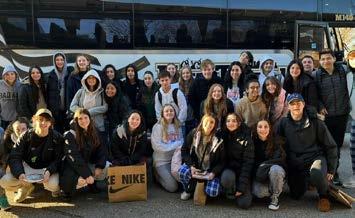
eir arrival marked the rst year of the Argentina Spanish Language Exchange program, which had been set to begin in 2019 but was postponed for three years due to COVID-19.
World language department head Suzanne Murphy-Ferguson said that the program had been highly anticipated.
“It was initially just a contact with administrators and teachers. We began in the years prior to the pandemic with some remote connections. After three years of that, we were all set for an exchange,” she said. “We had increasingly escalating ways of getting students in contact with one another, and it nally came to fruition.”
In addition to encouraging student participation in the program, Spanish teacher Cynthia Manthei helped plan the exchange by meeting with Colegio del Carmen administrators to coordinate logistics. Manthei said that the students and faculty from both schools expressed immediate interest in the exchange.
“At Newton South, we have had many service trips in the [world] language department under the Spanish program, but we haven't really had any exchanges in my memory,” she said. “ ey have them in the French program, and they have them at Newton North, so everybody was interested on both sides.”
Senior Anna Zeren hosted an Argentine student and said that the exchange program
gave her the opportunity to improve her knowledge on Argentine culture and language.
“I love Spanish and I really wanted to improve my Spanish, so that was one factor.
I also wanted to do this [visiting] program freshman year, but then it got canceled because of COVID-19,” she said. “It’s been a long time coming and I am really excited to get to know Argentine culture.”

Exchange student and rising senior Lauti Avila said that she decided to take advantage of the program to experience a new way of living and move outside of her comfort zone.
“I wanted to see another culture and different things from what I did every day in my house, and I liked that we had the opportunity to get closer to other people,” she said.
As part of the program, hosts spent as much time with their visiting students as possible to show them the di erent aspects of American life. Zeren said that she enjoyed sharing her hobbies and interests with her exchange student.
“I do gymnastics, so I showed them the gymnastics gym. I also am part of the Children of the Candy Corn improv group so they came to practice for that, and it was fun to show them my after-school activities,” she said.
Exchange students also visited famous locations in Massachusetts through group activities and trips Manthei helped to organize. During the weekends, she said the students visited Boston, Cape Cod as well as several historical sites.
“
e students toured MIT, Harvard, BU and parts of the Freedom Trail. ey went to the play last Friday night, which was really fun. We had a potluck and a marshmallow night.
We did a lot of fun activities together, plus they came to classes,” she said.
While the students enjoyed exploring the region, they understandably encountered many cultural shocks. Confronting these curiosities and preconceived perceptions is the basis for growth, Murphy-Ferguson said.
“It is so easy to have stereotypes about di erent people, and when you actually live through the culture of another person, you begin to understand more in the commonalities than in the beginning,” she said. “You need to walk through the rhythm of somebody else's life and to see the things that are surprising.”
Argentine senior So a Lavastrou said her biggest surprise was the di erence in school structure.
“In America, you have to move classrooms, but in Argentina, we stay in the same classrooms, and the teachers are the ones that are moving. We start school at 7:30 a.m. and we nish at 1:30 p.m.,” she said.
Junior and host Lexi Cooke said she gained a new cultural perspective from the Argentine students.
“ eir customs and their interactions seemed di erent at rst, but that [didn’t] stop them from becoming really good friends with us,” she said. “Since they're di erent, we can actually learn a lot more from them. All of us ended up having a lot of fun sharing what was di erent about being in Argentina and what they did di erently.”
Murphy Ferguson said that despite the language barriers, navigating a new place is a rewarding experience.
“I watched these kids return much more self-con dent,” she said. “When you live
somewhere where you don't speak the language, you’re in a position where you have to [adapt] in order to get by and navigate the situation.”
Until April when South students are set to travel to Argentina, Cooke said that she will stay in touch with her exchange student to continue fostering their cross-cultural connections.
“We were very close while she was living here, and once she left it's harder to keep that connection, but I still de nitely see us being really good friends in the future,” she said. “I'm glad that we've been keeping contact because that makes it so we actually gain something from it and have [global] connections.”
To many, the prospect of spending two weeks away from home in a country with a drastically di erent culture may be overwhelming, and Manthei said that she has seen incredible growth in student participants.
“One of the biggest moments was when a student turned to me and said, ‘I didn't think I would ever want to go to Argentina. I didn’t want to do this. My parents forced me. ey pushed me, but now I can't believe how much I got out of this, and I am really excited to go to Argentina.’ at's what it is all about,” she said.
Murphy-Ferguson said that exposure to di erent cultures is an important part of being a global citizen, a value the world language department continues to emphasize.
“We provide opportunities for students to experience life outside of South and outside of our American culture not only to learn more about others, but also because you gain perspective when you can look back on yourself and your own culture,” she said. “It gives us the opportunity for much greater cultural understanding and access to the world.”
 By Hannah Leese and Sarah Schwartz
By Hannah Leese and Sarah Schwartz
She ran a 63-second nal 400 meters. And she was a junior in high school.
It’s the girls’ one-mile nal of the 2019 Massachusetts High School Indoor Track State Championship, and Lucy Jenks, then a junior at South, is in the lead with Natick senior Grace Connolly closely in pursuit.
Jenks rounds the nal bend with Connolly still right on her heels. In the nal stretch, Jenks uses her lethal kick and pulls away to cross the line rst.
Steven McChesney, the girls track and cross country coach, said he knew going into the last lap that Jenks had it.
“Grace has already made a tactical error, and she can’t match Lucy kick for kick,” he said. “Her last 400 is like ‘wow.’ It’s just amazing.”
Jenks and Connolly often competed head-to-head in the most competitive meets. Just one year and one town separated the two, but their relationship extended past that rivalry, McChesney said.
“People misunderstood their rivalry. ey knew they liked each other, but people observing from afar didn’t know that they had a bond of respect. at bond of respect turned into a bond of roommates,” he said.
Jenks graduated South in 2020, joining Connolly to run track and cross country for Stanford University. In the three years since, Connolly said they have grown close as roommates and teammates.
“She feels like a soulmate,” she said. “She is so con dent in herself, but also radiates this positivity that we all really feed o of. We do some pretty di cult workouts here at Stanford, and she is just always someone who we can rely on, whether that’s pacing us or leading that front group and bringing us all together throughout the workout ... She just cares so deeply about all of us and will go out of her way to chat with anyone and everyone on the team and really just cares about how people are doing.”
Julie Mallatt, Jenks’ mom, said that the best part about cheering Jenks on is seeing her joy.
“She's really good at seeing the big picture,” she said. “She isn't spending a whole lot of time putting pressure on herself about it. It's all about enjoying it and enjoying school and enjoying your friends.”
As a runner at the Division One collegiate level, Jenks said that she appreciates the Stanford team’s camaraderie and their bond.

“What I really love about running in college and at Stanford speci cally is just how good and deep our team is. It's really special to be able to be pushing yourself really hard with all these girls right next to you that are just as competitive and just as willing to work hard,” she said.
Jenks just completed her third cross country season for Stanford and has already been named an All American and two-time
U.S. Track & Field and Cross Country Coaches Association All-Academic.
She was a part of the PAC-12 XC championship team in 2020-21, and as a sophomore she placed 15th in the 5,000m at the NCAA outdoor track championships. She said that a lot of this success is due to training with McChesney in high school.
track team as a freshman, she began with sprint events, not distance. McChesney had known about her speed — she ran under 13 seconds for 100 meters in middle school — but had no idea about her amazing endurance. Within a few meets, Jenks transitioned from running 300 meters to 1,000 meters and has been a distance runner ever since.
Although she shone in her individual events, McChesney said she was just as dedicated, if not more, to team relays. Jenks led South’s girls 4 x 800 relay to All State wins three times.
“She loved that as much as anything else that she’s done as an individual,” he said.
Doug McCarthy Girls Soccer Head Coach“Steve did a really good job preserving me. ere's a lot of girls that I see now in college that were better than me in high school and were training so much harder than me in high school, and don't have as much room to grow, whereas I feel like I was able to just naturally progress and get better,” she said.
Although it may be surprising, Jenks was not originally a runner, nor a distance runner when she joined track. As a kid, Jenks was not initially particularly athletic, Mallatt said.
"When she was really young, we thought her brother and sister were the most athletic because they just were high energy and really very, very active in sports. Lucy, we always thought, was not that way,” she said.
However, Mallett said that at just ve years old, Jenks proved her family wrong.
"Lucy ran around the track and won it by so much, she beat third graders and fourth graders,” she said. “We were like ‘wow.’ We had no idea,” she said.
Jenks’ running career didn’t end at age ve — she won eight track state championships and set the All State indoor mile meet record in high school, where she juggled varsity and club soccer with running, and ran just indoor track her rst few years.
When Jenks rst joined South’s indoor
Senior Amelia Everett, who will join Jenks on the Stanford team next year, and currently holds six All-State mile titles herself, ran with Jenks her freshman year. Everett said that in addition to her incredible athletic feats, Jenks is a team leader and a positive presence on all of her teams.
“Lucy is very competitive and focused but also knows how to have fun,” she said.
Jenks played high school varsity soccer for three years before transitioning to running cross country in the fall of her senior year. Her combination of speed and stamina made her a dangerous wing.
As a freshman, she was 10th in scoring in the Dual County League and was the team’s Rookie of the Year. Going into her senior year, she was a league all star and was elected to be one of the team’s captains.
Ultimately, Jenks quit soccer to run cross country her senior fall. She said she decided to pursue running, as it provided her with a wider range of opportunities.
“[I thought], ‘Okay, wait, I think this running thing can take me a lot further than soccer can’,” she said.
Girls soccer head coach Doug McCarthy said that the team appreciated her contributions while they lasted.
“We all hated to lose her on the team. People just enjoyed having her as a teammate, and she would have made a fabulous captain,” he said.
She hasn’t slowed down since, nor forgotten her roots, McChesney said.
“She texts me and says …‘Oh Amelia ran so well. I’m so glad you guys made it to States,’” he said. “She knows and remembers where she came from,” he said.
Jenks (left) competes against elite distance runners in Pac-12 race as a freshman.“Well, we all hated to lose her on the team. People just enjoyed having her as a teammate, and she would have made a fabulous captain.”photo contributed by Lucy Jenks
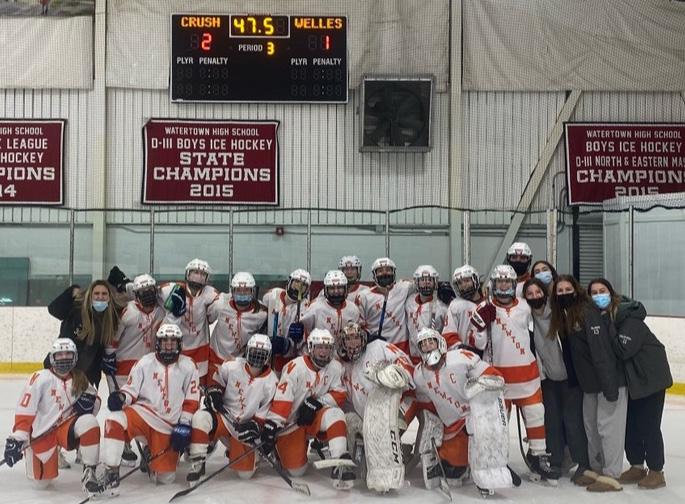 Andrew Feinberg & Elijah Kosto Sports Reporters
Andrew Feinberg & Elijah Kosto Sports Reporters
ey aren’t any lions or tigers (or bears), but rather the Crush, a di erent mascot representative of a hybrid team. Unlike most other high school sports, the girls ice hockey team combines North and South players into one team and includes coaching sta from both schools.
With a season spanning from their rst game on Dec.10 until mid-February, the girls battle teams from all around eastern Massachusetts.
Both schools have struggled in the past to ll the program with only their respective students. In 2013, South formed a team with Brookline and was able to have a JV team for the rst time. In 2018, the dual program with North was formed.
While the rivalry between the two high schools is infamous, team members say they shed their school ties at the rink door. After only one year on the team, South sophomore Mady Daley said that she is already close with her teammates from North.
“I probably wouldn't cross paths with that many of the North girls, [but] we're spending every day together, and so we really formed a great community and connection,” she said. “I talk to them even when we’re o -season.”
Captain Hadley Conroy, a senior at South, said that she enjoys being on a team with students who reach beyond the South community.
“It's really nice to be with people in
Newton that you don't see every day. And it doesn't really feel like we're rivals. It's just one team. We put aside the rivalry,” she said.
Most athletes learned to play the sport in programs like Newton Youth Hockey Girls and continued their careers on club and town teams. For South freshman Ava Barrett, this is a very di erent team from those she has played on before.
“ e team is more closely knit than my town team,” Barrett said. “We all go to the
same kind of school, so I can relate with them about teachers.”
According to South sophomore Cecilia Sheehan, the teammates’ bond extends past the rink.
“We just do simple things normal friends would do outside of school. ere’s no di erence.” she said.
As with any sports team, a strong connection with the coach is essential. Scott Heslin from South and Kevin Flynn from North ll
this role, helping the team improve and bringing the girls closer.
North sophomore Ellie Fahey said one of her favorite memories with her coach came before a game after school.
“We were all really hungry because school had just ended,” she said.“So our coach stopped at a grocery store and bought us sandwich materials, and we passed them up and down the [aisle] of the bus to make sandwiches before the game.”
Flynn said that even before the start of the season, the players have already put a lot of e ort into the team.
“Nobody knows that they practice a couple of days really early in the morning. ey put a lot of time and e ort into it and it's always been a joy coaching,” he said.
e team practices one to two times a week at 6:45 a.m. Despite the early wake-up, Daley said that she enjoys spending time with her teammates any time of day, especially in the morning.
“I'm really grateful to be on this team — even when I’m tired in the morning and it’s hard to wake up for practice, I just feel like I'm a part of the community and I'm happy to be there,” she said. “Even though I'm exhausted, being on a bus and playing music in the locker room is something that makes me really happy, and it's a great experience.”
Conroy said that in the end, the hard work and practices are worth it for the special experience of the game.
“I just love hockey, and so does everyone else,” Conroy said. “ at’s why we do it.”
A new athletics facility in Boston Landing opened in April 2022, and supposedly houses the fastest track in the world. Appropriately titled “ e TRACK at new balance”, this 250,000 square-foot athletics center houses a state-ofthe-art track, complete with space for 5,000 roaring fans.

Senior boys indoor track captain Marcelo Kuperwasser said that he’s excited to use the best technology athletics has to o er.
“Not all tracks are built equally. Depending on how the track is made and the composition of the actual ground you're running on, it'll be more bouncy with more energy return,” he said. “We'll just have better times because it's a better track. People get to run faster, jump higher, jump further, and so on.”
Since 2002, high school athletes from all over the state have raced at the Boston University (BU) Track and Tennis Center. For even longer, they have raced at the Reggie Lewis Track and Athletic Center, known for its poor air quality and the origin of the infamous term “Reggie
Cough,” used by runners to refer to the burning sensation in runners’ lungs following a race.
Senior girls indoor track captain Christine Zong said that, compared to the old facilities, running at e TRACK will be a big step up.
“Most of our meets were at Reggie Lewis and BU, which is pretty old. e air is really bad, and there's not much space, so it's gonna be really di erent to be at a brand new track that has all these high-tech features,” she said.
For good reason, the new facility is in high demand, hosting many collegiate, professional and high school meets throughout the year. Since typical indoor meets lasted four to six hours, meets needed to be cut shorter and became varsity-only competitions this year, girls track assistant coach Ariel Kenyon said.

“ ey have a really tight schedule, so we only have three hours to compete,” she said.“We just don't have enough time to get everyone in, so our big meets are going to be varsity only. We have four on the calendar right now of JV-only meets, most likely at BU.”
Instead of the program racing all together, meets will be divided by level, on di erent days and at di erent locations. Zong said JV-only
meets have existed for years, held in South’s eld house and run by coaching sta and varsity athletes. Now, they’ll be run by DCL o cials.
When a meet was running especially late, Zong said it was the JV races that were on the chopping block. With the new system, they’ll always get a chance to run.
“Varsity events will run rst, and then sometimes we'll just run out of time for JV events, especially the sprints, which a lot of JV kids tend to lean towards. Sometimes, a JV athlete wouldn’t even get to run in their meets because of this lack of space and time. Now they’ll be able to,” she said.
Even though the combined meets can be arduous, sophomore Max Hubbard said the competitive nature of varsity athletes can be a positive in uence.
“Just having the opportunity to see what varsity looks like when you're racing is great,” he said.“If there's less pressure at a meet because no one needs to score, people might just not take it seriously or as competitively.”
Existing cohesively as a single program regardless of racing level is a fundamental tenet of the team, senior girls indoor track captain Mitchy Bojar said.
“I can honestly tell you that I don't even
know who's on JV and who's on varsity,” they said. “People always raced two separate events as JV and varsity, like one event varsity but then run a JV relay. It’s never been ‘ ese are the people who are varsity, these are JV.’”
e whole team always supports each other, regardless of racing level, they said.
“I could always hear everyone cheering for me through the noise, through everything,” they said.“It just builds you up so much, but now some of my friends on JV might not be there.”
Despite the di cult length of meets, Kupperwasser said that he prefers staying for hours, united as a whole team.
“I don't like it because as captain I want my team to be together. I want a whole team,” he said. “Yes, meets are long, whatever. But I want everyone there. I want everyone encouraging each other.”
Bojar said they plan to work hard during practices and team-bonding activities to keep the team united.
“We’re going to make sure that we all warm up, practice and work out together, including everyone,” they said. “[We’re] making sure that everything, except the meets which I can't change, is the same, so no one pays attention to who races what.”
e FIFA World Cup is the biggest sporting event in the world and was expected to draw in more than ve billion viewers, according to NBC Sports. Every four years, one nation hosts the month-long spectacle, where hundreds of thousands of fans ock from all around the world to attend.
In 2010, the International Federation of Association Football (FIFA), the governing body of the World Cup, selected Qatar from a group of ve bids to host the 2022 World Cup. Criticism and outrage ensued, mostly directed at the FIFA president at the time, Sepp Blatter. With new reports of corruption and human rights violations, the beauty and thrill of the game has been overshadowed by the horrors that went into hosting it.
With a population of 2.9 million people, Qatar is the smallest country ever to host a World Cup. In 2010, Qatar had only one stadium large enough to host a World Cup match; seven more had to be built in preparation for the tournament.
But the problems didn’t end there. e country lacked adequate transportation and accommodations for FIFA’s estimated 1.2 million fans who were to attend the tournament. Business Insider estimates the total cost of the World Cup to be about $229 billion — 16 times more than what Russia spent in 2018.
Seven stadiums, hundreds of accommodation buildings and several brand-new transportation systems had to be built. With
a small domestic labor force, Qatar relied heavily on migrant workers from other countries, especially Nepal, India and Bangladesh.
In order to work in Qatar, migrant workers had to obtain working visas, which Business Insider approximated as costing up to $4,000. Unable to pay that cost, many workers turned to their Qatari employers to sponsor their visas, which trapped them in a punitive labor system called the kafala system.
Under the system, the employer has complete control over their workers’ jobs and immigration status. Workers in this system, who helped to renovate and upgrade the Khalifa International Stadium, where Team USA played their nal match, earned an average of just $2,640 a year.
Dangerous working conditions compounded these low wages, as construction workers found themselves building in the scorching heat of the summer months, in temperatures that surpassed 110 degrees Fahrenheit. Heart problems and body deformities due to heavy lifting were widespread.
It was only after seven years of construction and in response to increasing pressure from human rights groups that FIFA banned certain working hours in the summer months. Still, e Guardian estimates that 6,500 migrant workers died working in Qatar from 2010 to 2020.
According to e New York Times, 200 of those deaths were recorded by human rights groups as suicides. Because workers’ immigration and job status were controlled by their employers, the freedom to visit loved ones and the ability to reform working conditions
was restricted, leaving them trapped. Qatari organizers denied the high death count.
Another concern regarding Qatar surrounded the country’s anti-LGBTQ+ stance. Al though Qatari organizers have stated that members of the LGBTQ+ com munity are welcome, homosexuality is still punishable by prison in Qatar.
ian reported that FIFA banned the rainbow arm bands famously worn by captain players like Lionel Messi and
Although Qatar has tried to maintain a good image, the government has struggled to silence protests from participating countries. In March, Germany’s players posed for a photo of themselves dressed in black with white letters across their chests, spelling out “HUMAN RIGHTS.”
Human rights groups supporting the #PayUpFIFA campaign have also called for $440 million, the amount of money allotted to the winner of the World Cup, to be raised in retribution for the fallen workers.

For a World Cup with as many underlying issues as Qatar 2022, the drama of the game spreads far past the pitch. Blatter, the ex-president of FIFA, was quoted in NPR saying, “[Choosing Qatar to host] was a bad choice, and I was respon -
Politics, death and corruption have dominated this World Cup, casting a shadow over what is a truly beautiful game.
ere’s something about big meals and big games that seems to make for the perfect family gathering. In my own household, the annual NFL football post- anksgiving dinner and prime-time NBA game on Christmas Day have become staples of my family’s holiday traditions.
is year, the Patriots played on anksgiving for the rst time since 2012, so naturally, much of Massachusetts spent the holiday watching Mac Jones and company take on the Minnesota Vikings. My family is no di erent; every year we sit down, bellies lled to the brim with turkey and watch football for hours.
Sometimes, the games are great and everyone is engaged, whether it be quietly from the couch or yelling from the beanbags on the oor. Sometimes, the games drag on, and out come the fantasy football score updates and bathroom breaks.

But even when the Texans and Jaguars are trading three and outs, we still watch, chatting aimlessly and soaking up the opportunity to be together as a family on the holiday. I’ve grown to appreciate these moments and cherish the wholesome togetherness of grabbing a blanket and watching football with your family.
Our traditions don’t stop just at football. e holidays also happen to be a great time to watch college basketball in full swing, and from a young age, my brother and I were always glued to the TV watching whichever schools happened to be playing on ESPN.
When I was six and my brother was four, my dad, hoping to translate our love for watching basketball into some physical activity, bought a six-foot mini basketball hoop. Now,
more than 10 years later, the hoop still stands in our hallway and has graduated from receiving lay-ups to vicious dunks and o -the-wall shots as we’ve grown up. A simple gift has turned into a staple of my childhood — something my dad surely couldn’t have imagined when he bought it years ago.
When the weather gets cold, we wrap the hoop in garland, and friends and family alike grab the little green ball, turn on the electronic scoreboard that goes with it and ball out. at hoop has stood the test of time and creates a sense of consistent bonding between me and my family.
A more wacky family tradition is our superstitions, which all started during a Patriots-Seahawks game. Yes. at game. Back in February of 2015, we watched intently as the Patriots took on the Seattle Seahawks in Super Bowl XLIX.
With 31 seconds left on the clock, the Seahawks were just one yard away from scoring a touchdown and winning the Super Bowl. I was losing hope, but my ever-creative dad thought of a way to keep my dreams alive.
He noticed some small round magnets from a play set scattered across the oor. He picked one up, and told me to shake it for good luck. Thus, the “hope balls” were born. On the very next play,
Patriots rookie cornerback Malcolm Butler intercepted Seahawks quarterback Russell Wilson’s pass, clinching the Super Bowl victory for the Patriots. In the years since, I’ve treasured the hope balls, and they still sit on my desk, ready for a shake anytime my team needed a miracle.
e hope balls’ record isn’t perfect: our UNC Tar Heels losing the 2022 March Madness National Championship was a colossal hope balls failure, but I’ll always remember what they did for me on that Super Bowl Sunday. I will never stop shaking them during every big game.
Sports and holidays have one major thing in common: they bring people together. For as long as I can remember, the two have
been deeply intertwined in my family. Being able to share my passion while connecting with my loved ones brings an unmatched feeling of joy to the holiday season.
I've grown to appreciate these moments and cherish the wholesome togetherness of grabbing a blanket and watching football with your family.graphic by Julie Wang
For junior Luca Del Porto, who founded Beginner’s Lift in September, lifting became an escape when the uncertainty of the pandemic threw o many of his routines.
“A typical day for me would look like: waking up, going on Zoom and throughout the day just eating … I was really only moving around the house,” he said.
Lifting turned out to do more than just structure Del Porto’s day: it improved his mental health, he said.
“When you do a big lift and you reach your goal of any kind, your serotonin levels rise. Studies have shown that you really see an increase in emotional wellness and health when you go to the gym,” he said.
According to a 2018 article published by Nature Communications, increasing levels of serotonin, a hormone that naturally regulates stress and is linked to feelings of happiness, can increase the brain's ability to grasp and learn new information — bene ts that especially extend to students.
rough the years, the Fitness Center has garnered controversy and complaints, but new programs like Beginners Lift o er stu-
dents con dence in South’s gym. e culture is changing.
Del Porto said his goal with Beginner’s Lift was to make the gym more welcoming.
Open to all students, Beginners Lift meets every Wednesday during WIN block. e goal was to make the gym more approachable, for everyone,” he said. “We love going to the gym, and we want to give that opportunity to other people.”
Wellness teacher Alan Rotatori advises and supervises Beginners Lift. He said that having a gym at the school helps students learn to lift safely so that they can lift con dently in other places as well.
“It’s all about teaching kids the right form and techniques so that they can go o by themselves and feel comfortable about what they’re doing,” he said.
Outside of WIN blocks, South’s tness center is open to students after school until 6 p.m.
For many students, especially those with after school activities, the weight room makes working out a feasible possibility.
Senior and nordic ski team captain

Mariel Shapiro brings the nordic team to the weight room to workout during dryland practices. Shapiro said that her schedule is often packed with school and extracurriculars, so having a gym inside othe school gives her and the rest of the team a convenient option for workouts.
Shapiro said that lifting with the nordic team fosters unity and makes working out fun.
“If I did [go alone] then, especially at the very beginning, it could feel intimidating, but if you are with friends or in a team, it is not really intimidating. It is just a lot of fun,” she said.
Freshman Nora Prasad says that she started using the gym once her friends began going, and she wanted to learn more about working out.
“I had friends that were doing it and I thought it'd be an interesting way to use the gym because I've only used dumbbells before,”she said.
Freshman ayer Bialek said that he nds the weight room a valuable place to learn important lifting tips.
“[Weightlifting] just a useful skill and you can take advantage of it here … I think
it's helpful to learn how to use the equipment safely and what's the best form,” he said.
Rotatori said that although joining a program at the gym can be daunting at rst, he believes that students get more comfortable with the environment over time. Going to the weight room can help to increase their con dence.
“It can de nitely be intimidating when new people walk into the weight room and hear the sounds of weights falling, but I think that over time people get used to it and start liking the sound,” he said.
As Beginners Lift welcomes students into the gym while showing them the importance of lifting, Del Porto said the club can be bene cial to anyone interested in the practice.

Rotatori said he believes that the gym is constantly improving, and the South community is fortunate to have such a large and clean tness center.
“I really think that we are going in the right direction as a community and as a program in the weight room,” he said.“We are extremely lucky to have the opportunity to use a state of the art facility inside our school.”
As the Men’s World Cup draws to a close, it is undeniable that the world’s eyes are largely on soccer right now; however, as usual, this attention has greatly eclipsed any spotlight that women have ever received. Despite recent progress with equal pay in sports, there still is a long way to go for the Women’s World Cup to be treated with the same respect as its male counterpart.
For as long as we can remember, gender equality has been an issue in sports. Female and male athletes have not received anywhere close to equal salaries, and while still the case in many sports (the average male NBA player earns $5.3 million a year, whereas the average WNBA player earns $130,000 a year), the United States national soccer teams have made great leaps of progress in evening the wage gap.
is May, the U.S. men’s and women’s national soccer teams made history when they announced the rati cation of two new monetary agreements. After years of pushes by the women's national team players’ union, several court cases, protests and Megan Rapinoe’s visit to the White House, they achieved equal pay for both teams.
However, because the marketing for the two teams still favors men’s soccer — awarding them more advertising money and bonuses — the players are still not pocketing equal money. is World Cup, when the U.S. men advanced to the round of 16, they secured a prize of at least $13 million — more than the combined prize money the U.S. women’s team earned for WINNING the last two World Cups. How about this: after the federation takes some of the men's prize money, the remaining money will be split with the women's team.
While some argue that the money shouldn’t be split among the teams, according to an article published on the Major League Soccer website, sharing the money fosters unity among the soccer teams and allows for equal quality of venues, eld playing surfaces, hotel accommodations and sta ng for camps and charter ights.
It is unfair that in order to achieve this equality, women have to“take” some of the men’s money, but that’s the reality of the sexist world of sports. e men are not doing anything fundamentally better in order to earn more money — they are just men. Female athletes
work just as hard as male athletes, but they don’t get nearly enough recognition or money.
In a perfect world, the prize money shouldn’t have to be split; the prize money for the women’s tournament should be equal to that of the men’s tournament. However, that is simply not the case. e soccer industry and sports industry as a whole is heavily skewed in support of the male teams.
Whenever you walk into a restaurant, turn on popular TV stations or read the sports section of the Boston Globe, viewers are only exposed to male sports. Soccer is no di erent: female soccer players are not seen as equal to their male counterparts, despite achieving far greater.
According to Statistica, a software specializing in market and consumer data, during the 2019 Women's Soccer World Cup, which the U.S team won, advertisers spent $96 million on ads aired in the U.S. TV networks. A year earlier, for the 2018 Men’s World Cup, in which the U.S. didn’t even qualify, spending on advertisements reached $350 million — over three times the amount than for women’s soccer.
We can’t stop pushing progress after
achieving equal pay; we must fundamentally change how the World Cups are designed. Let’s start with the name. ere’s one World Cup for men and one for women, yet the Women’s World Cup has to be speci ed with the word ‘women’ and the Men’s World Cup doesn’t, deemed solely the World Cup.
I think the soccer federation nds power in simply naming it the World Cup because dramatizing the tournament implies more power and strength and therefore more advertisers. What they don’t recognize, however, is the negative connotations it leaves for the Women’s World Cup — it implies otherness and invalidates everything that female soccer players work for by deeming that their World Cup as not the main competition.
As a society, we must take major steps in the way we perceive sports. Men are not better than women, and women are not less competitive than men.
I hope that this summer, the 2023 Women’s World Cup receives the recognition it deserves, and I can’t wait to see the powerhouses of women's soccer perform on the biggest world stage.

2) What did the ocean say to the beach? Nothing, it just _____.
3) Cambridge school where students can apply restrictive early action
6) Apt acronym for Seasonal A ective Disorder
7) Fourth day of the week and the name of a popular Net ix show
9) Why did the chicken cross the road? To get to the other ____.
10) Maura Healey will be the rst female ______ of Massachusetts
12) Black Panther’s home country
13) Mr. Wilson’s footwear of choice
15) African team that knocked Portugal out of the World Cup
16) e only department that currently has a uniform grading policy
18) New athletics facility to be used by the indoor track teams
1) Host of the Men’s World Cup
4) South students hosted exchange students from this spanish-speaking country
5) A menorah has 9 of these.
8) America runs on _____.
11) South’s a capella group

14) ‘20 graduate and All-American, now running cross country for Stanford
17) Michelle who stars in "Everything Everywhere All at Once"
Good question. I ask myself the same thing every day. Maybe it's because I'm intimidatingly cool, or maybe it's because I'm a cartoon lion. If I nd out, I’ll let you know.
I’d suggest having an honest conversation. But before you do, make sure you get all your upset emotions out somehow.
I suggest crying into a bowl of ice cream, blasting Olivia Rodrigo and TSwizzle or screaming into a pillow. Anything that’s cathartic, dramatic and a tad bit aggressive will do the trick. Once you’re feeling better, you’re ready to talk.
In conversation, remember that relationships are di cult, and people make mistakes. It may help to understand why
For now, I'm trying to enjoy life as a singleton. So what if we’re desperately lonely? We've got freedom, baby! Nothing's better than that.
he cheated. You do not need to justify his actions, but forgiving him may provide you with some closure.
Depending on the situation, it is really up to you to make a choice. Whatever you do, remember your worth: if getting back together is what will make you feel respected and happy, then go for it. If not, there are plenty of better sh in the sea. If I may, I’d like to introduce you to Chronically Alone. I think you two will hit it o
Winter blues got you down? Doing a puzzle is sure way to put a smile across your face!Answers: Qatar, waved, Harvard, Argentina, candle, SAD, Wednesday, Dunkin, side, governor, Newtones, Wakanda, Flip Flops, Lucy Jenks, Morocco, History, Yeoh, e TRACK
Leonna, The Lion's Roar mascot, gives advice and answers anonymous student questions
Dear
Despite my best efforts, I'm
Why don't I have a boyfriend?
I get back with my ex even though he cheated on me?
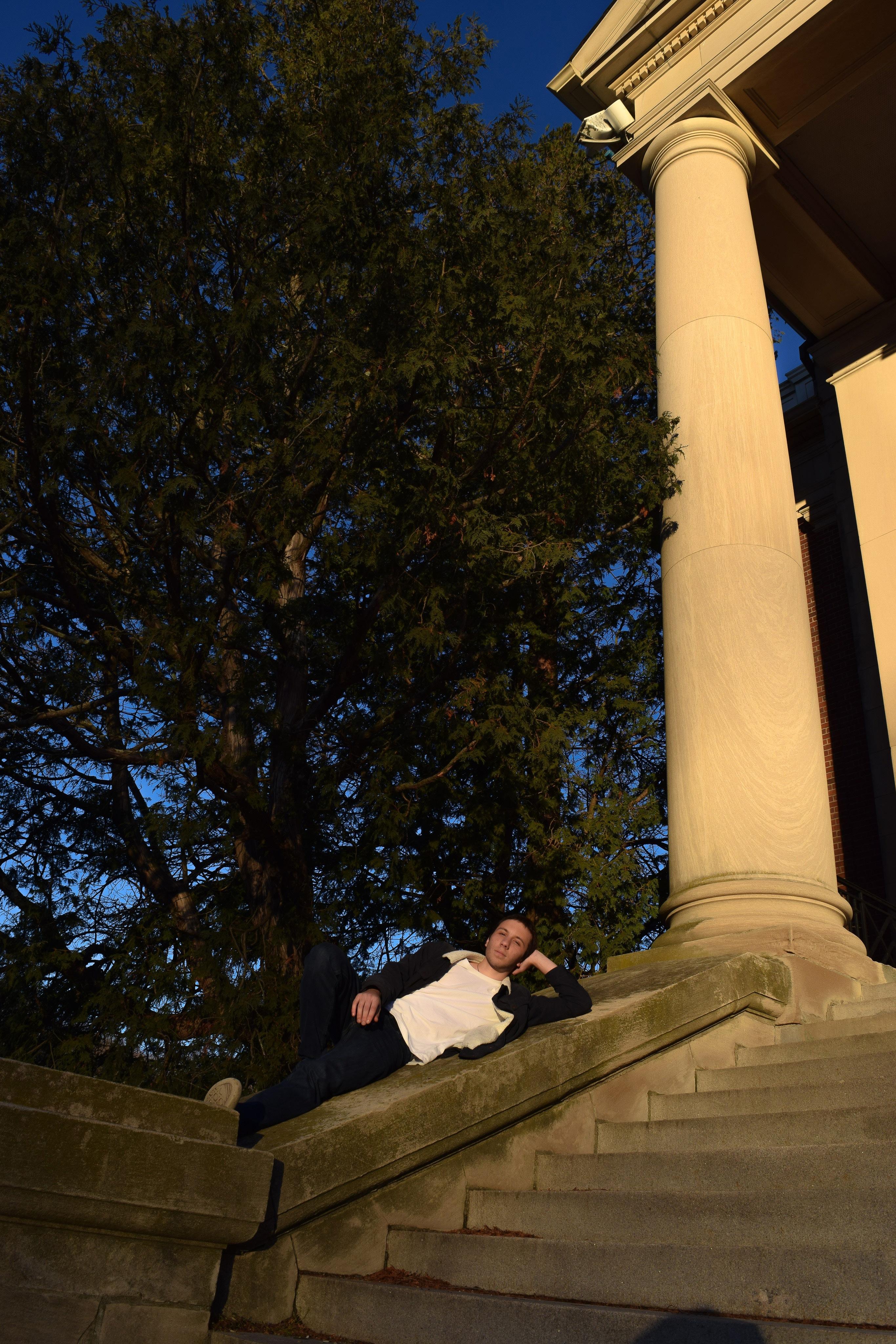
Gen Z steps onto the national stage after midterm elections and paves the way for future youth engagementphoto by Bella Ishanyan Senior Dan Bahar poses on the steps of Newton City Hall